#and even when it comes to having a Critical View of any belief system / way of living / spirituality it's like...people are on that already
Text
already thinking "and by 'religious' really i mean 'christian'" re: how the term "religion" is not really useful when it's largely like, from a christian perspective, what is considered "equivalent" of christianity, see: perhaps a "rival"/obstacle to some person or group being considered christian....and even if not thinking about converting anyone, resulting in some at best misinterpretation / misrepresentation based on framing it through/as [element of christianity] and limiting of any more accurate language
like how tumblr recommends me a post about someone thinking about "religion" in general and concluding that it's Weird and perhaps Wrong for anyone who is a "true believer" in their religion(tm) to Not be proselytizing / trying to Convert everyone. like yeah why isn't everyone being an evangelical christian, they ought to be, benevolently informing all those around them that they're going to hell, otherwise. don't see any problem with this conclusion, or that someone's getting antisemitic in the notes already in agreement, or that That's Not How This Works and you don't just know how All "Religion" works based on considering it to be an alternate version of christianity (which in itself doesn't All work like that either)
#and even when it comes to having a Critical View of any belief system / way of living / spirituality it's like...people are on that already#without having to see it from a christian perspective or understand the only possible framework for it as [critiques of christianity]....#a dogmatic approach / doctrine of Salvation....not how it all works out there re: ways anyone can be anything besides christian#So Bizarre why everybody's not all trying to ''convert'' everyone else in the world....is it.#what; like; ''you'd think everyone would be launching an inquisition'' like would you.#even if you know fuckall abt non christian beliefs / perspectives / traditions/practices / identities / ways of life etc....#we could maybe go ahead and question this conclusion. or perhaps go ''but also i know fuckall about all that so why am i theorizing'' like.#and again there are non ''western'' christian traditions....and of course individuals and philosophies within christianity who would also#not think you can only Truly be christian by going ''and i'd better be trying to convert everyone. or i'm being a jerk'' too#not actually the case that everyone thinks everyone else who doesn't share some ''religious'' factor is Damned To Hell or an equivalent....#anyways telling tumblr actually this particular post? isn't for me. and i don't thank you#another tiresome factor of [mass at the benedictine monastery] like the homilies/sermons were especially exhausting#they always were but like ''what are you even talking about'' as one priest goes on about how it's silly for people to say they're#Spiritual but not Religious b/c the only way to be spiritual is to be christian lite & if you're Genuinely even christian lite then you#ought to realize you should go full throttle christian. like a) No b) why are we preaching to the choir here. we're all at Sunday Mass???#not like any sermons ever feel that thoughtful when like too much analysis is like uh oh? a bit heretical are we??? which is not universal.#gee thanks for this [are we just supposed to all sit here feeling validated in our superiority; or...?] experience#wisdom you couldn't totally get from someone going on some self-assured monologue abt heathens these days over dinner or sm shit#really makes you think. and then someone will be really thinking & going ''shouldn't everyone w/a Religion be an Evangelist'' hmm: No.#and they aren't ''wrong'' about their own beliefs approaches perspectives identities traditions etc for it either. Done#anyways changed ''religious parent'' to ''christian parent'' for its own enhanced accuracy & precision alike....
2 notes
·
View notes
Text
The Reigen Arataka Deranged NormalMan Review
Do you ever think about how Reigen has like. A really strange belief in The System and How Things Should Be. Like REALLY strange. Whatever he's got going on is so much weirder than "scammer with a heart of gold".
I think it all comes together if you read the 10th Season 3 omake like, seriously interrogate this:
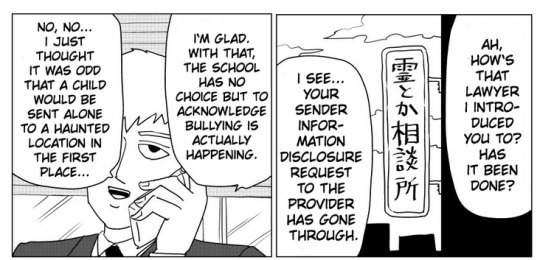
This is normal, if comedically thoughtful and realistic for a shounen character. This guy talks like a mandatory reporter. What's strange is what immediately follows:
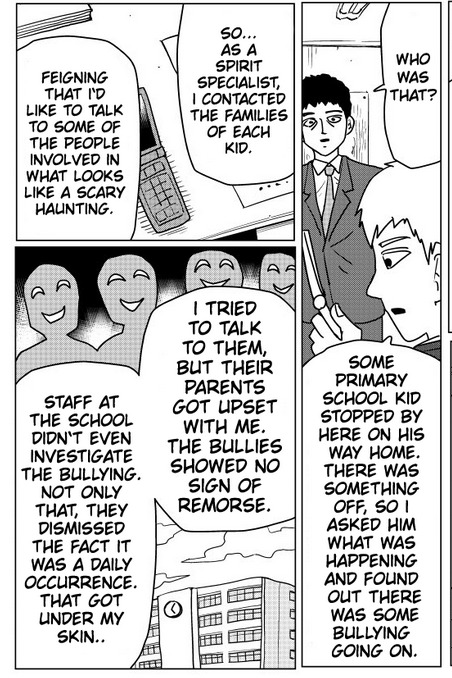

"AS A SPIRITUAL SPECIALIST" DOING A LOT OF HEAVY LIFTING HERE REIGEN
Not only did he hunt down the families of the children bullying his client (insane. where did he get that info), he also contacted the school as if he were representing his own son in order to get justice, and then hunted down a source of complaints when the school fell through.
This is like a genuinely bizarre level of commitment to the bit, and the bit is "the system works, and if it doesn't work, we will find a system that does work, and if we cannot, hell or high water it is my PERSONAL RESPONSIBILITY to make the system stop slouching so it works again".
Long thread on the manga with this reading⬇️
Before I start. Reigen adopting Teru is more IC than you think but I don't think it is IC in the way people think it is. I think about this a lot and I think people who do it because they like Reigen aren't understanding how into his bit he is. Guy who talks to social services
So remember the arc that won people over to Reigen despite the fact he's an asshole who takes advantage of Mob and derides him constantly in order to keep him complacent?

He has Mob's phone on his GPS. This makes sense; he's been taking him out and about since he was 11. Very responsible!
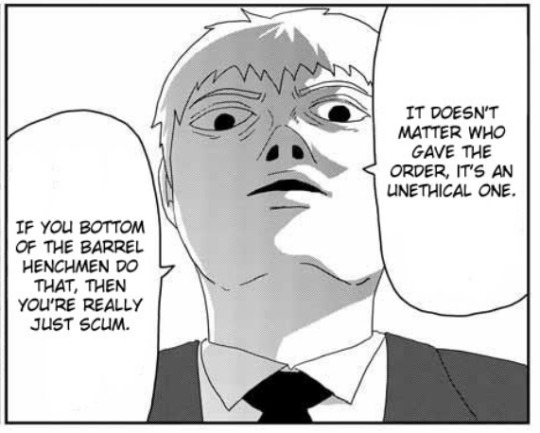
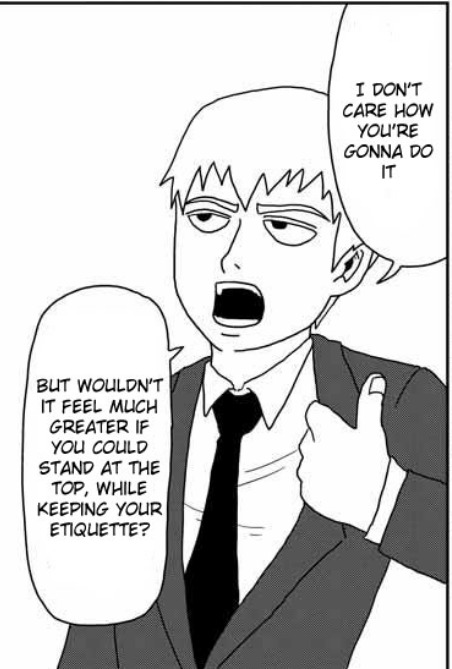
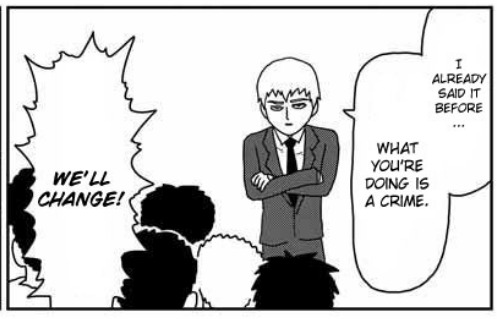
Reigen dismisses the "Boss" mistake thinking well, it's a misunderstanding, but it got me in. Yet as soon as he heard they're committing crimes, he VISIBLY puts on his Boss Pants to chastise them. Again, normal so far. I think any scammer with a heart of gold would do this. (And foreshadowing for why he retried reprimanding the Claw Cadres a second time after getting power.)

Again. He's a scumbag. So he leaves Mob to beat their asses using his previous rhetoric. But then!

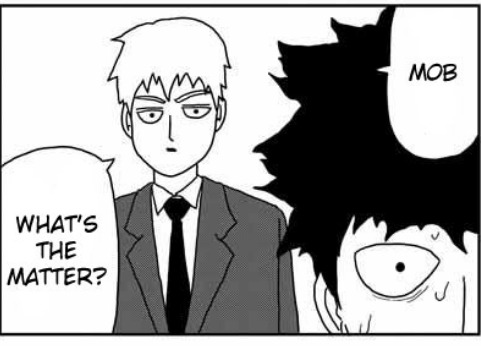
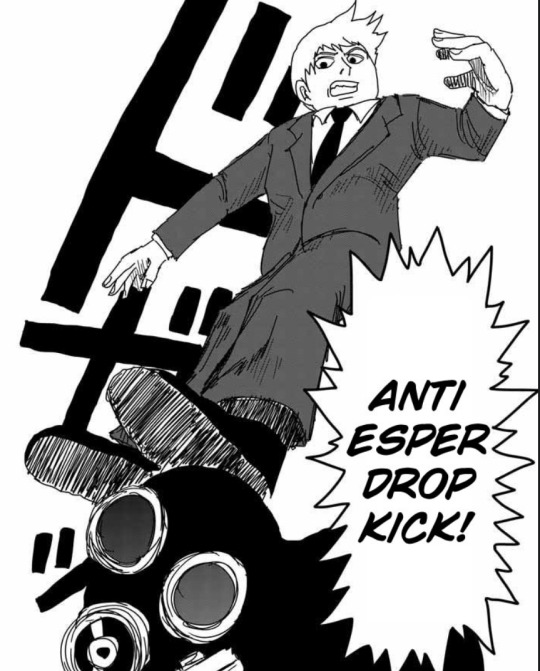
Reigen's shady morality is more like "people who can take care of things should take care of things". To him, Mob is the Authority on Espers, and can handle conflict like this. Immediately upon becoming aware he can't, Reigen thinks "oh, okay, so the only person who can take care of things is someone who can deescalate". (Pictured: Deescalation)

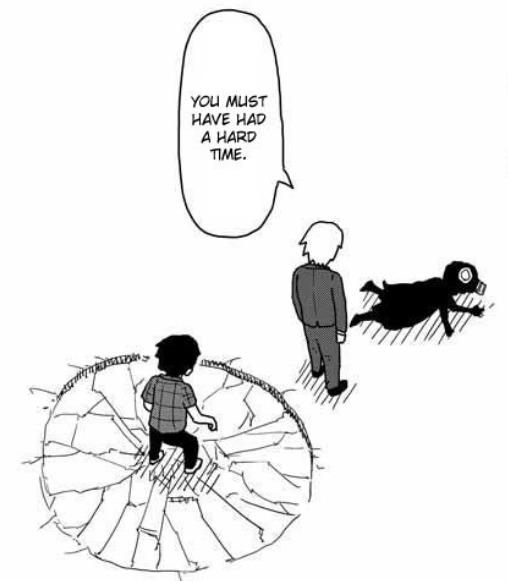

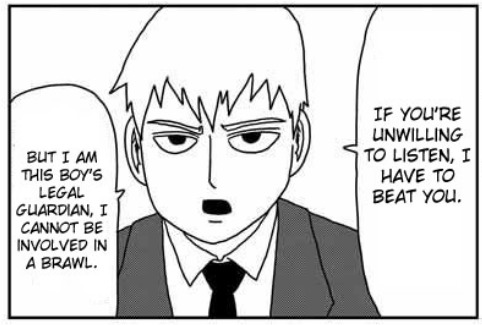
Okay. Besides the fact this is insufferable as a general concept - YOU just told him to handle it YOU are the source of his stress - his first step in deescalation is to force Mob to back down. Rather than asking him not to fight, he reestablishes "rules" in order to convince Mob he must back down - the same way he tried using what he said to worm his way out of dealing with this shit - and then sets himself up as the authority figure to which the others must obviously defer in matters of His Boy, like a parent accepting criticism at a PTA meeting. This isn't Reigen claiming Mob so much as "in order for them to not attack Mob, they must view me as a representative for Mob".
And like a good authority figure:
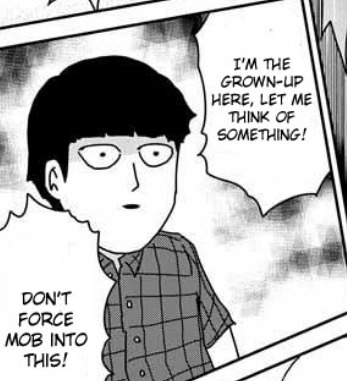
Continuing with his phrasing:


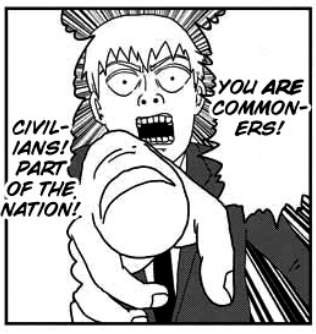
If you think about it, this is like...an objectively very strange and incredibly bold approach to this situation. They're homicidal. Reigen is a DERANGED level of Normal Man. He has this image in his head of normalcy, of the world at standard operating procedures, and reinforces it right through an entire conflict. Carceral beliefs don't even factor into this, simply expressing his principles and expecting them to fold.
And they do lol. I keep wondering how Shou must have felt listening to him talk like that
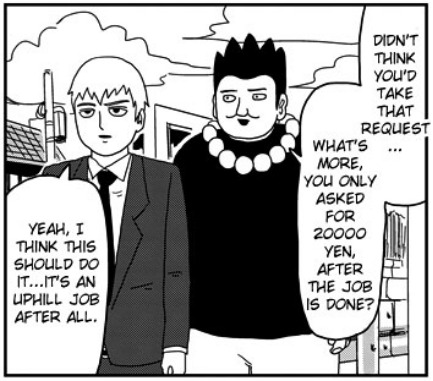

We see a little more of his good side in work; when he was getting so little work it was affecting his grocery bills, this moneygrubbing scammer still asked for like $200 to clear an entire city of hauntings. (His regular exorcisms are around $30). Fair prices are part of his principles of how the business should be. He operates basically at-cost. He mentions he wanted to come out here because he's bored. He's killing time as a career.
Aside:

Just realized he called Mob in last minute so Mob didn't know he accepted crops instead of money. Shigeo didn't like that
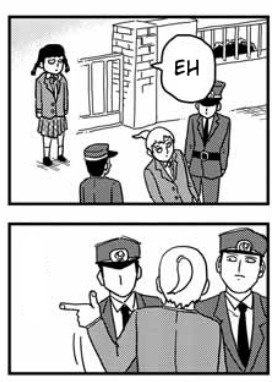
So consider that he never got caught here and there was a call on the news to hunt him down at the end of this bit: for the average viewer of the anime, it's just funny, but this is part of the Mogami pre-arc so we've gotten a hold of him by now; he probably holds an inherent belief that the police will intercept him and not Mob. Why wouldn't they? Why would an adult man want to dress up in a highschool girl's uniform? The System will understand.

Not relevant to my point but I like how he realizes what's wrong with Mob way before the final arc, just not why it's happening. Also he doesn't say anything.
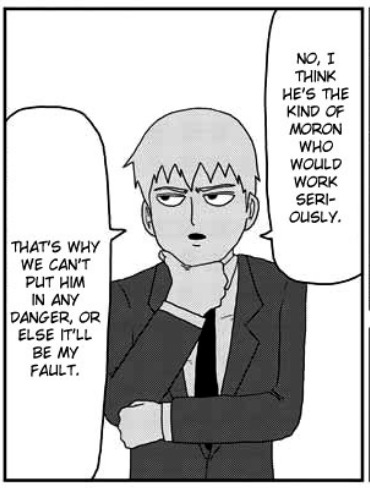
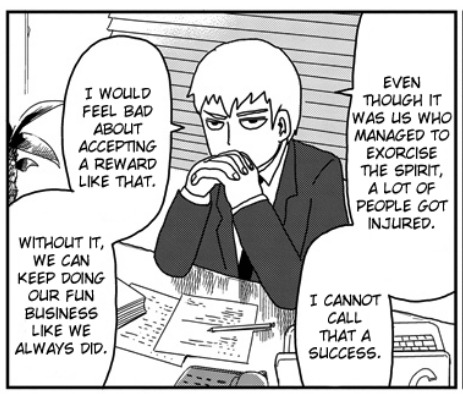
With the way his principles are, you really get the feeling that Reigen does his best to avoid culpability specifically because if something happened that was his fault, he'd have to step up to the plate to compensate for that, which is troublesome to him who is a career time-killer. It does not occur to him that an actual bad person and scammer would not step up to the plate as a matter of course. This is his way

What I find really interesting is that this Militant Insane NormalMan does have a sense of wanting something "special", but rather than whip Mob up the way Dimple did Ritsu, he ended up projecting his own values onto Mob, as if he could recreate a special "self" within him. He's always deriding him and baiting him and lying to him in hopes of creating a superb person that a special individual like Mob finds admirable, as if Mob is the authority on his quality of character. Sad! lol
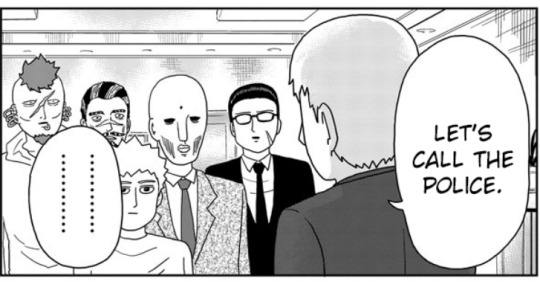
Anyway, it adds a lot more kick to this famous line. Reigen genuinely believes in Authority
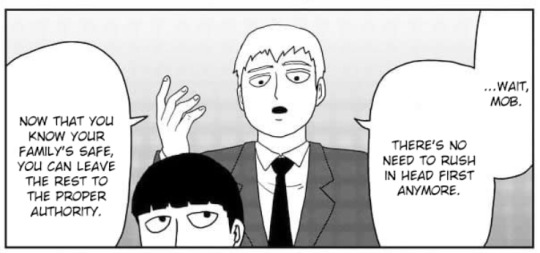
Authority works!

And if Mob (the authority on espers) doesn't work, who's the person who MUST step up to the plate [common sense]? You guessed it.
There are other aspects of Reigen's character that everyone and their dog has already picked up on (his self-loathing is the entire reason the way he talked to Mob in Confession arc hit so hard), but this one's my favourite. He's insane
1K notes
·
View notes
Text
Okay I’m not done talking about this actually. Re: the Dishonored series’ attempts to reconcile its critical views of imperialism with keeping the characters who sit at the very top of the Empire likable, I think DH1 is considerably less obvious/glaring about this internal conflict than DH2 because: 1) it’s, duh, the first in the series, and suspension of disbelief comes a lot more naturally the first time you’re told “things will be better now, for real” than the second; and 2) Jessamine’s rule sees so little screentime it’s much easier to portray the miseries of the game as entirely attributable to Burrows’ rule (and the actions of other assorted Bad People™) without directly confronting the imperial system that put them all in a position to seize and promptly abuse power in the first place. Under a read more because I can't shut up, sorry.
Like, say you play DH1 for the first time on low chaos: you get the happy ending epilogue speech, and even if it seems to smooth everything over a little too optimistically for a game that otherwise shows a collapsing society and the corruption that brought it to that state in grim, unflinching detail, well, that’s mostly okay—you maintained low chaos, after all, in essence proving the Outsider’s “Perhaps that’s just the nature of man” theory wrong, and the good effects just rippled outward to a much a larger scale, which was pretty much the point of the chaos system in the first place. If it all sounds a little bit like the happy ending to a parable not particularly grounded in the realities of systems of power that the rest of the game was critiquing, maybe that’s just what happens when an entity as long-lived and far-sighted as the Outsider summarizes a period that is little more than a miniscule blip in time to him. Stand far enough back from something and all the rough edges blur out to nothing.
(Plus it’s a video game after all, so maybe you can suspend your disbelief/any personal political beliefs about real world empires you may have brought with you. Maybe it's nice to imagine that things can change meaningfully for the better for Dunwall and the other Isles simply by plopping a Kaldwin back onto the throne.)
The existence of DH2 makes it clear, though, that the ending monologue to DH1 really is more fairytale than reality (or, you know, what happens when a game gets greenlit for a sequel the devs of three years ago didn't know they'd get). A Kaldwin takes the throne—under the watchful eye and protection of her witchcraft-using Serkonan father, at that, a man with viscerally personal history with the Abbey, the City Watch, and the deeply xenophobic nobility—and despite all those very real family connections and personal reasons to want to reform things for the better, we step into Emily’s rule to see the people of Serkonos being trampled on and worked to death in the silver mines, the Abbey still freely hunting down and torturing or otherwise “disappearing” people suspected of witchcraft, and the Guard casually beating and murdering citizens—in one notable case, by throwing one directly into the same brutal Wall of Light technology mobilized to great effect by Burrows’ corrupt regime and that is still in wide use around Emily’s Empire fifteen years later.
Some of this chaos was instigated by Delilah and her inner circle (especially the Duke) leading up to the coup, but much of it is preexisting corruption that can’t be blamed on her—she and the coven certainly had no reason to prop up the Abbey, for one, and she didn’t have to create the aristocratic bitterness motivating turncoats like Ramsey, only give them an outlet for what was already simmering. Meagan, Sokolov, and Lucia Pastor all make it abundantly clear that this was not a momentary slip-up—Dunwall Tower had been looking the other way while violence and unrest grew for some time, because the human cost of keeping silver flowing was out of sight and out of mind, a function basically built into the system of Imperial rule. Not a bug, but a feature. A tendency toward retaining corrupt institutions, an erosion of empathy, because that’s what keeps the wheels turning and wealth being funneled upward.
So when low chaos Emily professes in mission nine that she’s learned her lesson and that from now on she’ll Pay Attention, really! to the four nation Empire she’s the head of, and the happy epilogue plays and we get another Outsider monologue about the golden age ahead, it just seems…vaguely absurd? Like, we already saw this! Burrows, Campbell, and the Bastard Trio™ of the loyalists were deposed or otherwise gotten rid of, making room for Good People™ with Good Intentions™ to take their place in charge and fix things—you’ve got Emily on the throne with Corvo to guide her; Yul Khulan, a “kind” man and eventual close personal ally of Emily’s, becomes High Overseer; Curnow, widely reputed as a Reasonable Authority Figure and rare man of principle in the Guard, has survived (and presumably still has some years of service as a Captain before the retirement mentioned in The Corroded Man).
And then we fast forward fifteen years and all these groups...still suck? The Empress hates her job and is eating off plates made of silver mined by Karnacan laborers dying hideously of terrible respiratory ailments, the Overseers we see in Karnaca are ransacking homes and torturing Outsider worshippers (a group including such dangerous people as *checks notes* newspaper artists), half the City Guard is on the payroll of the shitty aristocrats supporting Delilah’s coup, and the Grand Guard is passing the time by throwing people into Walls of Light. Emily’s reign began with a veritable A-team of Certified Good People and fifteen years later it's barely made a dent, because the system of imperial rule is built from the ground up to shelter corruption and complacency, to resist change, no matter who’s in charge and whether that person is “paying attention” or not. It’s beyond the power of one sufficiently motivated Empress and a team of well-intentioned people in positions of authority below her.
It’s tempting to say “no, it really was just an issue of Emily not taking her duties seriously, look at Jessamine’s rule, or Euhorn’s before her!” but the thing is Obvious Disasters like Violent Coups Aside we really don’t have much evidence that their rules were all that much better, or at the very least any less prone to corruption? DH1 again has the advantage over DH2 here, mostly by way of omission. We don’t get to actually see what life in the Empire is like under Jessamine, just that tiny sliver of time in the Prologue returning as Corvo to Dunwall Tower, where despite the player being told there’s a deadly plague about to bring the city to a “breaking point,” the scenery is beautiful and calm and the staff are polite and affable. It makes for very compelling contrast when the game fast forwards six months to the dank misery of Coldridge Prison, and then later the grim state of the streets filling up with corpses and weepers.
Mission six completes the comparison with a return to Dunwall Tower, where the courtyard is now brimming with hostile guards and surveillance towers and tallboys, and one lone maid who openly laments Jessamine’s passing. Life under the authoritarian despot who purposely instigated a plague for the purpose of wiping out the lower classes is, obviously, much worse than life under the benevolent Empress who is introduced to us passionately advocating for saving the lives of all of her citizens. But, in the same way Emily and her inner circle of Well-Intentioned People weren’t enough to dislodge the entrenched corruption and brutality—or prevent a new wave of it—Jessamine’s kindness can’t paint over the miseries of the imperial system she presides over. We the players see Coldridge Prison for the first time in the six-months-later flashback of Burrows’ rule, but it existed during Jessamine’s time—guards state explicitly in the DLC that she and Corvo used to come inspect it, in fact. Jessamine wholly loves Corvo, a native of Serkonos, but anti-Serkonan prejudice runs rampant in her court and city. Corvo and Emily wholly love Jessamine too, but the people of Dunwall are somewhat divided on the matter (“Long live the Empress!” “She was a WENCH!” / “Not everyone did, but I really liked the Empress…”). Burrows deceived Jessamine and took advantage of her trusting nature, but he only had the resources to do so in the first place because of the system that promoted him to Royal Spymaster, a position of incredible power and very little accountability.
Euhorn we know the least about, but we are told he enjoyed a “prosperous age”—a sentiment that falls somewhat flat when we learn that he had an affair with a chamber maid (the power differential of which is highly questionable at best), strung along the resulting illegitimate daughter with promises of elevating her to a princess that he never intended to keep, then took his chance when said daughter was blamed for breaking a vase to throw her and her mother out onto the streets, where the mother is brutalized by a prison guard and eventually dies in agony in debtor’s prison, leaving the daughter to fend for herself alone in the world. All of which shows us that the Empire is, in this age of “prosperity,” still a place of extreme power imbalances where the Emperor takes advantage of women in his employ, debtor’s prisons exist, guards can cause fatal injuries to civilians on a whim and face no consequences, and children are thrown with disdain onto the streets to die. Which, on many levels, is not all that different from the ages of other rulers who follow.
tl;dr these games show us over and over again that the Empire is built on a fundamentally broken system that perpetuates corruption and then try to append “but it’s okay so long as the people in charge are good people who are paying attention to their jobs” to the end of them for the sake of keeping those characters likable, and while the first game can get away with this by virtue of being the first game and using Jessamine’s rule primarily as a way to showcase how bad Burrows’ rule sucks by comparison, this falls flat when the very existence of the second game provides ample evidence that the Good Intentions of Generally Good People are not enough to counteract the entrenched cruelties of the institutions that keep imperialism afloat. Okay I'm going to go get another hobby now bye.
179 notes
·
View notes
Text

By: Andrew Doyle
Published: Feb 17, 2024
This is how it begins. “Why not add your pronouns to your email signature?” “Why not announce your pronouns at the beginning of meetings?” “Why not encourage your staff members to ask for pronouns in day-to-day conversation?” After all, it’s just about being compassionate and creating a more “inclusive” work environment. Only a bigot would object to that…
It’s this kind of skewed reasoning that has led to the firing of Fran Itkoff, a 90-year-old volunteer for the National Multiple Sclerosis Society, who simply expressed confusion when faced with a request that she add pronouns to her emails. “I had seen it on a couple of letters that had come in after the person’s name”, Itkoff said in an interview, “but I didn’t know what it meant”.
We can hardly be surprised when a nonagenarian is befuddled by this strange new quasi-religious ritual, so rapidly has the practice taken hold. This didn’t stop the National MS Society from turning its back on Itkoff, a volunteer whose commitment to the charity dated back for six decades. For committing heresy against the Holy Creed of Diversity, Equity and Inclusion, Itkoff was immediately sacrificed. The statement issued by the National MS Society claimed that her query about pronouns was “viewed as not aligning with our policy of inclusion”.
Declaring pronouns makes little sense in any case, given that they are used in place of a name when talking about someone, not to someone. And besides, human beings are perfectly capable of determining someone’s sex without being told, usually instantaneously. Of course, according to activists, all of this is irrelevant. We are assured that sex has been superseded by “gender identity”, that mysterious sense of self that few of us believe even exists. It would be like being told to announce the colour of your aura every time you began a conversation.
Like the vast majority of the population, I use pronouns to denote the biological sex of the person to whom I’m referring. And I certainly would not comply if commanded to declare my own due to my innate aversion to any form of compelled speech. The lessons of history are clear: when those in authority begin to demand the use of certain phrases, they have taken the first step on the pathway to tyranny. I do not wish to see a future in which we are forced to stand in lockstep and chant the approved slogans of the ruling class.
Of course, the declaration of pronouns is far removed from any such scenario, but the principle to me is sacrosanct. I will not be told what to say by anyone, least of all those who claim to know what is best for the good of society. Authoritarians have always couched their demands in faux-benevolence, and we have seen how gender ideologues have a particular tendency to viciousness and bullying. “Be kind… or else” is not a maxim to which I am willing to capitulate.
To ask for pronouns in the workplace is the equivalent of suggesting that employees pledge fealty to a deity they do not worship. It is a kind of test, a way to ensure that the tenets of Critical Social Justice – otherwise known as “wokeness” – are being observed. Spinoza argued that for any man to “be compelled to speak only according to the dictates of the supreme power” is a violation of his “indefeasible natural right” to be “the master of his own thoughts”. Once you agree to make statements in favour of a belief-system you do not hold, you are surrendering your agency to those who will exploit it.
While the declaration of pronouns remains a purely voluntary matter, it is fair to say that no-one’s free speech is being violated. But the consequences for non-compliance in the workplace are becoming increasingly severe. Members of staff are passed over for promotion, they are smeared as unreconstructed bigots and “transphobes”, and eventually shunned and isolated. I have written before about friends of mine in the acting profession who feel uncomfortable in stating pronouns at the beginning of rehearsals, but know that they are unlikely to be recast if they refuse. This may not be compulsion, but it is coercion.
We see the same phenomenon on social media, where trans rights activists routinely denounce and defame those guilty of the crime of “misgendering”. They report users in the hope of seeing them banned, contact employers and claim to feel “unsafe”, and even occasionally call the police. This is the essence of cancel culture. They are, of course, free to criticise, even in a robust and rude manner. But to seek to destroy someone’s livelihood for their choice of language is fundamentally authoritarian.
In the same vein, we have seen a handful of gender-critical feminists attacking people online for choosing to use “preferred pronouns” in certain cases. Again, the criticism is valid, but once it strays into the realm of libel, misrepresentation and character assassination, these critics are merely borrowing from the playbook of trans activists. In the tenor of some of these online free-for-alls, it has been difficult to tell one faction from the other.
When it comes to the declaration of pronouns, I have often wondered how long it would take before requests transformed into demands. The sacking of Fran Itkoff by the National Multiple Sclerosis Society has the ring of inevitability about it. Many of us saw this coming. This is why we need to be vigilant against anyone who attempts to compel the speech of others, for whatever reason, and in whatever context. If we tolerate this inchmeal erosion of our liberties, we will doubtless live to regret it.
--
If you haven't been following it, Fran Itkoff is a 90 year old woman who volunteered for the MS Society for sixty years after her husband had MS (multiple sclerosis). She didn't understand what all this talk about pronouns was about, asked, and was then told her volunteering services were no longer required.
Some of you may well go, "ew, LibsOfTikTok, ew, ew." Okay, but hear me out: shut up and read the screenshots. They tell the story.
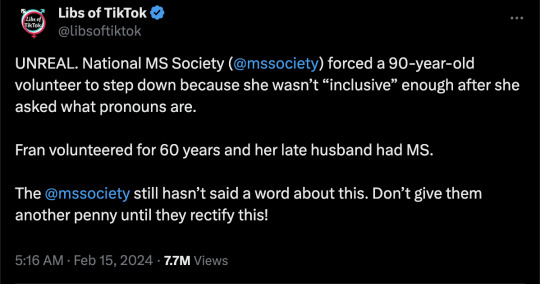
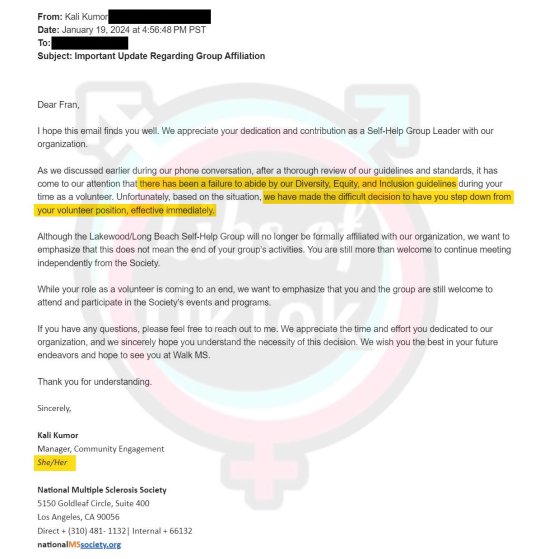

youtube

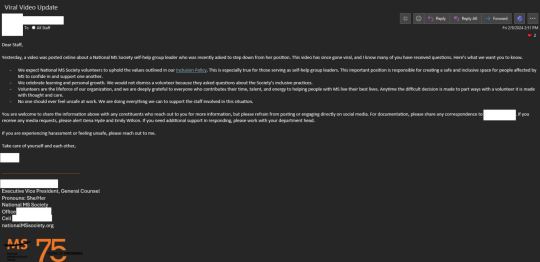


Kali Kumor is the stupid little girl who removed a woman who had dedicated her life, and worked longer than this vacuous apparatchik has been alive, to helping others.



One supposes that all the MS in the world has been cured, given how eager they are to tell dedicated volunteers that they're no longer needed.
--
A few years ago, there was a fuss about atheists being turned away from volunteering activities.
This is the same principle: adherence to their dogmatic ideology supersedes what is supposed to be their organization's mission and purpose: their "telos". This is why you cannot have two "teloi." One will always win over the other.
This is what I mean by ideological capture. The telos of the MS Society is no longer services and support for those with MS, it's "Diversity, Equity and Inclusion." That's their number one objective. And that means pronoun-policing and excommunicating those who aren't part of the cult.
It would seem both humorous, being so petty and stupid, and sad, given Fran's long service to the organization, but as Andrew Doyle points out, it's more insidious than that. It's compelled speech. It's about punishing those who will decline to be part of - or even simply don't understand - the fundamentalist, puritan religious ideology these fanatics have adopted and imbued throughout the organization.
Just as you must testify to Jesus as your lord and savior in order to volunteer at a soup kitchen or to raise money for cancer, they will demand you adhere to the belief in gender thetans in mismatched meat prisons in order to volunteer for the MS Society. In the name of "Inclusion,"
As Fran mentions, the MS Society has always been inclusive, but what she doesn't understand is that it's now Inclusive™, a brand name which doesn't mean including as many people as possible but including as many members of their cult as possible.
They're not looking for behaviors - e.g. respect, tolerance, etc - they're looking for beliefs. Enforcing a particular ideological belief system. They don't care that you might be an atheist who subscribes to secular humanism, or you could be a Xian who believes we're all children of God, they want to make you believe what they believe.
Resist it. They'll try to act like you're just being unreasonable for a small accommodation, but they know that it's how they get you to start complying with their demands. Like Islam, it's one little thing at a time. Don't draw pictures of Muhammad, that's not a big ask is it? Then it's respecting the Quran, then it's not blaspheming Muhammad or Allah, and so on.
#Andrew Doyle#Fran Itkoff#Kali Kumor#MS Society#gender identity ideology#gender ideology#queer theory#pronoun culture#pronouns in bio#pronouns#volunteering#compelled speech#ideological conformity#religion is a mental illness
28 notes
·
View notes
Note
I have a bunch of thoughts related to your recent post on lefty antisemitism, but I don't want to dump a big long thing in your inbox - let me know if you want me to send it, other than that just know you're not alone trying to wade through the messiness of it all.
I know leftist antisemitism is alive and well, I know Jewish perspectives/experiences/identities are not valued, and I know there’s a load of misinformation out there when it comes to the conflict (though honestly, I don’t trust info from any side because everything is propaganda at this point). But I listened to a podcast episode (Joyous Justice - a Jewish racial justice podcast hosted by a Black & Cherokee Jew) that was a bit of a gentle kick in the pants.
To summarize some of the key thoughts: There is antisemitism in lefty spaces because there is antisemitism EVERYWHERE - and racism, sexism, transphobia, classism, ableism, and the like. Leftists are not immune to these things. And so when someone like me says “well I’m not going to engage with some progressive cause because I’m bothered by the antisemitism” it’s like, anyone else of another marginalized identity could have the same excuse for not participating because they will inevitably run into someone who is being shitty about their identity. It’s good that we have ways to process these harmful experiences, and we should try to hold people accountable, but it’s not a good idea for our self-defensiveness to stop us completely from engaging.
I’m not solidly feeling any of this right now, but I am trying to sit with it in the discomfort.
Hi there,
Look, I definitely see where you're coming from and where this podcaster was coming from at least in theory, but I don't agree.
Leftists absolutely have all the same problems any other group has, and obviously we all have to work on our biases and movements all the time to try and root these things out.
This is different and goes beyond that though, because the brand of anti-Zionism that is mainstream amongst American goyische leftist movements and individuals is deeply antisemitic as a part of the cause. Anti-Zionism as an intra-Jewish discussion need not be [internalized] antisemitism, and there are plenty of ways that one can critique specific actions of the Israeli government that are proportionate, fair, and necessary (yes, even as an outsider.)
However, calls for the literal dissolution of the entire country without a thought or care for the safety and well-being of the affected Jews or the Jewish people as a whole, combined with a deep suspicion (and frequently outright hostility) towards Jews who bring up antisemitism (especially as it pertains to rhetoric around Israel) and then adding your regular run-of-the-mill antisemitism on top, are common and accepted in leftist spaces. In short: antisemitism isn't just one unfortunate pimple amongst many other expected blemishes on the face of modern leftism - it's actually frequently taken up as one of the causes of leftism. This form of antisemitism is seen as social justice, and so arguing against it is seen not for what it is (begging for people to add even a little nuance and critically examine a belief system that leads them to call for the genocide of half the Jewish population worldwide) but rather as arguing for whatever terrible thing they want to paint Israel as this week, whether or not it's true and whether or not such a label could just as easily be applied to groups and nations that they will give a pass to.
Meanwhile, most of the goyim arguing in support* of Israel are frequently right-wing conservatives whose other views on human rights and moral progress I find rather repugnant and who frequently utilize standard conservative talking points about Israel's more strident critics to attack them on other levels. For example, I cringe basically any time I see any right-wing critique of, say, the very real antisemitism of Cori Bush or Rashida Tlaib, because I just know it's gonna be racist as hell.
(The * is because I don't honestly classify a lot of this as support for the Jews, so much as a handy vehicle for their anti-Arab racism, Islamophobia, and unfair painting of all Palestinians and/or Palestinian rights movements as terrorism. I would also be remiss if I didn't say that the same is frequently true of certain batches of leftists whose anti-Zionism is more of a handy vehicle for antisemitism than genuine, thoughtful, and helpful advocacy for Palestinians.)
But there are some conservative voices that do have genuine support for Jews and are pro-Israel in a way that is more nuanced and doesn't just use it as a tactic. And when I see that, and especially when I hold it up next to leftist comrades who would never in a million years advocate for policies that would wipe out half the world population of another minority group but will happily repeat those talking points against Jews as if it were a social justice cause, it makes me question the validity of everything else they're saying.
And so I re-run that calculus on every social issue I'm passionate about, to see if maybe I'm on the wrong side of it, and every time I conclude I'm still very much not. So then I go back to the drawing board and reconsider Jewish history, identity, and peoplehood, and the conclusions I've come to about Zionism from those things, only to return to the same position I was in before. I've heard the arguments. I've actively sought out and considered the other side on this issue, hoping to understand something new, and each new source I read solidifies my opinion.
So then I'm stuck with concluding that my best option is to seek out like-minded Jews and when outside allies or work is needed, just kinda go into it accepting that a significant portion of the people I'm necessarily aligning myself with for other important causes would likely leave me and mine for dead under the right circumstances, and view that as good and right and just.
And while I don't let that change my voting behavior or advocacy at a practical level, it also doesn't change the fact that it fucking hurts and that I'm morally right to be angry about it.
81 notes
·
View notes
Text
Over Casca’s naked body
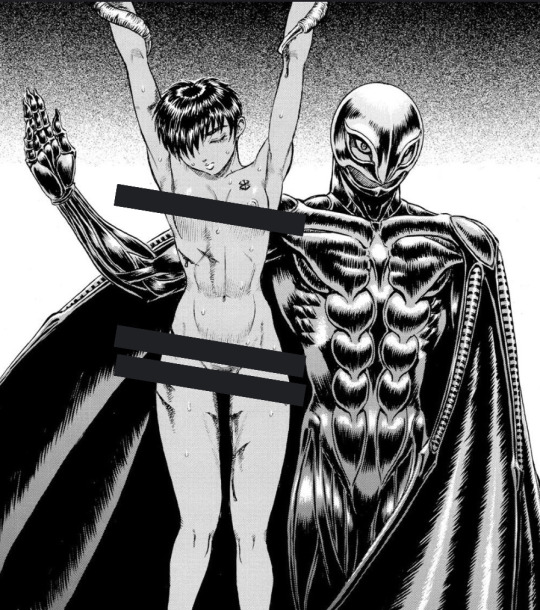
Part one: A long premise
We can’t escape from our geopolitical context even when we are reading manga. We have internalized a good amount of beliefs, values, practices, even regulations from our lived experiences and various simulacra we have been exposed to, especially those in an audiovisual form.
If you grew up in the US, you know that freedom of speech is a core value there. But, while you can say mostly whatever you want within your own country, the US constitution has given the government the right to regulate what comes in from abroad. [1]
And that power has been used. Idealistically, greater access to common technologies even before the internet should have seen a redistribution of the media-creating capacity to many foreign countries outside of the US, so that people could tell their stories. But that hasn’t always been the case, with some exceptions, especially if we consider the biggest narratives that reached global popularity.
During the Cold War, anything that might be considered “communist propaganda” could be seized by the Post Office and never delivered. Books or even souvenirs from communist countries, for instance. Pamphlets criticizing US foreign policy. (…) Obviously it wasn’t totally like North Korea, plenty of foreign movies and music were allowed into the US. But the media that caught on was either already Americanized, or so plastically exotic that it doesn’t really say anything about the culture where it is from. The Beatles were British, but they got their start covering American rock and roll musicians. When John Lennon stepped out of the line, the American government made sure that he knew it. Movies imported from Japan were mostly samurai flicks, with very few movies set in the modern day. The film Ikiru is widely considered the best Japanese film ever made (…) but this existential drama about a depressed lonely man was only given a limited release in California, and the poster was edited to feature a stripper who is only in the movie for one minute. The narrow stream of European movies that made into the USA came in the form of the French New Wave cinema, movies that were stylistically inspired by American films, but also so stuffy that few audiences would ever want to watch them anyway. This was further stifled by the Hays Code, a set of extremely strict regulations that were in place from 1934 to 1968. (…) Some things that were completely banned from ever being shown in any film included: bad guys winning. All movies must end with the police outwitting the evil criminals, or the criminals causing their own demise. Any nudity. (…) Blood or dead bodies. (…) Interracial couples. White people as slaves. Criticism of religion, or of any other country. Naturally this prevented the more artistically liberal European films from being shown in American cinemas and when they did get a release, they were usually edited (…). At least until the rules were abolished in 1968 and replaced by the age rating system we have today. [1]
Even after several decades of access to the internet and foreign cultures, some attitudes have been internalized and carried on. For example, I had direct experience of the ways my own culture has been perceived and stereotyped or interpreted in terms not dissimilar from the exotic. And the same happens to me probably if I don’t keep in check my own personal beliefs about cultures that have been presented to me in similar ways. And I was surprised to see by how deeply rooted and spread are certain attitudes towards punishment or violent retribution viewed as necessary, the policing and self policing, and the expression of judgments or condemnation, and all this can complicate the understanding of different forms of narratives and the acceptance of different cultural attitudes and norms, without the expression of any opinion about morality or legitimacy.
I am reminding you that this is a long premise because I evidently don’t have the gift of brevity but this article is about Berserk and Casca.
In 1956 Anna Magnani won the Academy Award for Best Actress for her first English-speaking role in the American movie The Rose Tattoo. In 1958 Miyoshi Umeki was the first Asian born actress to win an Academy Award for Best Supporting Actress in Sayonara, a movie that despite its title was an American drama starring Marlon Brando. It isn’t hard to see in these decisions from the Academy, or the ones that followed in other categories, the willingness to build relationships between the US and specific foreign countries where the American army had a massive presence and that after WWII were ideal places for American investors, considering significant rebuilding necessary after the loss in the war. The movie industry and everything around it had instrumental roles. When it comes to the Academy Award, it is very interesting to notice that the women were the first ones to be nominated, becoming ambassadors and facilitators of the reshaping of the images of Italy and Japan from enemies to new essential strategic allies in the Cold War. And here comes the problem of the exotic, because after several decades I still see similarities in the American perception of those foreign cultures, Italian and Japanese, to those easy and friendly and intentionally constructed imaginaries of that time. Take the press around Anna Magnani or Miyoshi Umeki for example. Terms are so widely used and repeated that they are still in their Wikipedia pages in English today. For what interests me here, I am going to quote or summarize parts of the video essay listed below as [2] but I really recommend watching it entirely. It really helped me understand some of the issues I am talking about here, but it is much more than just this. And there is footage worth the time.
[I know that many people here on tumblr really dislike YouTube videos. I understand why, when it comes to manga and anime, written articles have still better quality and content, in my opinion, but there are also many video essayists doing their due diligence on several other topics. And when I am busy cooking I put them on].

In the 1950s one of the problem with the new alliance with Japan was the widespread hate and racism towards Japanese people.
The government stepped in, producing educational films meant to endear Japanese culture to Americans (…) They showed off Japanese industry, introduced Americans to sushi and sumo wrestling, explained the country’s new democratic system et cetera. (…) A lot of [musical] acts that were popular with American soldiers, specifically exoticized Asian girls bands, like the Kim sisters and the Tokyo Happycoats, come over to the US and appear on television as both entertainment and a sort of cultural ambassadors, not only demonstrating America’s cultural power and dominance by performing recognizable American tunes, but also signaling to white Americans that those cultures didn’t pose a threat. (…)
It’s worth looking at this film [Sayonara] as part of a larger theme in a very specific post war moment. Gina Marchetti points out in her book Romance and the yellow peril: «Between June 22, 1947, and December 31, 1952, 10517 American citizens, principally Armed Services Personnel, married Japanese women. Over 75% of the total Americans are Caucasian». Meaning, Japanese war brides and the concept of interracial marriages was very much a conversation. (…) Sayonara must be seen as one of many films which called for a new evaluation of Japan as an enemy nation. (…) Much of the way [Miyoshi Umeki] was discussed is probably exactly how you might expect. The language journalists used to describe her was unambiguously racialized and often condescending. In the aftermath of her Oscar win, for example, Louella Parsons called her «a lovely little bit of Japanese porcelain», adding: «What a cute little thing she was in her native costume». Still, her Japanese identity also seemed to serve as a symbol, an embodiment of the new friendly Japan. In Miyoshi, Americans would find an idealized portrait of reconciliation, a woman who bore no resentment over the war, a woman who brought homesick American troops to tears by singing White Christmas, who adored American pizza, who learned English by listening to American records. She was accepted because she actively appreciated and participated in American culture. [2]
The roles offered to Miyoshi Umeki are significant in many ways. After Sayonara, she was cast to play other Asian characters besides Japanese ones. One recurring theme in those movies in particular is the contrast between modernity and tradition.
William G. Hyland writes, Flower Drum Song is a «clash between the Americanized lifestyle of the young Chinese and the traditions of their parents». (…) Miyoshi Umeki plays Mei Lee, a Chinese stowaway who arrives in the US for an arranged marriage. The more Americanized she becomes the more independent, the more willing she is to strike out on her own. [Chang-Hee] Kim writes: «[Flower Drum Song] flamboyantly shows that Asians in America were ready and willing to cast off their heritage and become real Americans in repudiation of the pre-war racial consideration of Asians as permanent aliens». I mention this not only because it’s one of Miyoshi’s major roles, but also because this theme, a supposed enlightenment via westernization, occurs again and again in her filmography, particularly in her work on television. Han [?] writes «Umeki’s representation on television is in constant oscillation between her status as a subservient Asian woman and her transformation into an assertive, modern female professional who has achieved independence through American cultural influence». [2]
Bear with me for a little longer if you can, because we are at the point where, watching the video, I experienced that sensation better translated visually in a lightbulb being turned on. I am skipping here the presentation of the story and footage from Miyoshi’s first appearance on television in The Donna Reed Show, but I once again invite readers to watch the video, which features high quality original footage. I was really struck by the “sensitive way” the American woman - Donna Reed I presumed - approaches the character played by Miyoshi, as the writers back then were well aware of the sensitive racial implications, and nevertheless a certain mentality pushes thought. Watching still, it is easier to avoid the presumption that in the 1960s “they didn’t know better” or that contemporary attitudes have improved greatly, just because we are more careful about the language we use.
The thesis statement of this episode is not subtle. The rejection of traditional Japanese customs allows her to live more fully in a democracy. Of course it isn’t really much of a choice, is it. Maintaining the customs of your culture or risking alienating your entire community. She changes her clothes, puts on a hat and goes shopping because she is an American now. Obviously these stories are told from the white American perspective, where this rejection of tradition and culture is portrayed as unambiguously positive and relatively tension free. This was not the case in Japan where the relationship between modernity and tradition were richly explored in cinema, particularly in women’s films. [2]
I would like to add that the independence that Donna’s character shows is only possible because of a series of factors, including the fact that her husband secures her a higher level of comforts, in comparison with lower classes or non-white Americans, and that domestic work is presumably done by home electrical appliances or other women, especially when you add child care and looking after the elderly to the equation. The unwillingness to consider those types of labor, traditionally carried on by women, as of equal importance to any other jobs is rarely discussed when it comes to the issue of women’s emancipation. Not to mention how, alongside this idyllic world shown on television, in the same country large numbers of women have to deal with continuous push backs in the name of different traditional values that all the same prevent many of them from achieving true equality. Those types of conversation and conflicts between traditional and modern happens at the same time in many countries and in most cases translates to continuous negotiations and compromises carried by men and women in real contexts and real situations, without necessarily white American women being aware of it or of all the necessary nuances.
Let me add this last element of conclusion about Miyoshi Umeki’s story.
In 2018 her son told Entertainment Weekly that in the 1970s she etched out her name on her Oscar and then threw the trophy away. Although he isn’t sure exactly why she did it he said: «She told me, I know who I am and I know what I did. It was a point of hers to teach me a lesson that the material things are not who she was». What Miyoshi Umeki achieved is pretty remarkable but one can’t help but feel that she could probably have done a lot more if she’d been allowed to move beyond her identity. [2]
Part two: Are we reading the same manga?
After considering all this, and more that I can possibly include in here to avoid this being even lengthier, I can’t help but wonder about the generalizations I have seen repeated vastly about portrayals of women in Japanese media, as well as misunderstanding of cultural attitudes towards nudity or the treatment of sensitive topics like sexuality and rape. There is a diffuse certain sense of entitlement, sometimes you can hear a condescending tone even, and this isn’t limited to the US. But why approach a foreign culture with a patronizing attitude instead of trying to understand the context more deeply? So many manga readers are willing to ask for clarification on translations, but not many ask about the context or the visual aspects involved in manga writing. I like to read analysis about different topics, so I look for them in English too because they are very numerous and easily accessible, but when it comes to the critique about the portrayal of women in too many cases I have to click away because of too many bias or that subtle sense of superiority of judgment. Berserk has become easily accessible and more and more popular but it is so greatly misunderstood at various degrees by a lot of its western readers - me included - and I really wanted to understand what is preventing, in most cases, a textual and contextual analysis.
The Hays Code hasn’t been around since 1968 but the sentiment that the only proper conclusion for every story is the triumph of the good guys and the punishment for the wicked is very much alive and well. There is this conviction that the only clever readers are those able to separate the heroes from the villains, or the good deeds from evil, and root for the right side to achieve retribution and satisfaction. The Hays Code hasn’t been enforced officially but it’s there in essence and every counter narrative has been rendered almost ineffective or judged poorly. As for the treatment of women, I don’t feel like we can honestly and surely compare or scrutinize Japanese media under special lenses. Nudity in comic books seems to me to be very common outside of Japan too, depending on censorship rules. I certainly notice how frequently Casca is shown naked or has been threatened with sexual violence, but I also notice that she isn’t the only one. The exaggeration of Guts’ muscles and the mutilation of his body are largely put on display. Griffith is intentionally shown fully naked, or completely covered by an elaborate armor, and he is subjected to many threats of physical and sexual violence as well. Charlotte is shown naked, but always in her bedroom, in a private environment or with a transparent cloth or a sheet of some kind to make her nudity different from the occasions when Casca’s body is publicly displayed. I am careful with my own thoughts when I read Berserk, I take the time to analyze my reactions and what I am feeling in these situations. I think that this is the reason that certain books or media are intentionally aimed to adults. I don’t feel a necessity to call to censorship or to give guidance of a moral kind but rather to make the necessary reflections. And I can’t imagine how someone can understand the story without taking their time with it.
Part three: Casca’s rape
In 1973 the animation studio Mushi Production released a film called Belladonna of Sadness. I haven’t seen it yet but I know a little about it and I am planning to watch it when I feel like I can do it without being affected in a bad way. It is well known that Miura remembered this film when he designed the Eclipse. In 1975 Pier Paolo Pasolini directed the film Salò or the 120 Days of Sodom, which I strongly don’t recommend to the casual viewer or anyone who felt even slightly offended by Berserk. Suffice to say that in a particular political climate and in the context of the sexual revolution of the late 1960s, in the 1970s nudity and sexuality were at the forefront of the debate and human bodies were exhibited in a symbolic way that can be misunderstood today without knowledge of the context. Gender expression was questioned and men grew their hair or refused to wear suits or to follow rigid dress codes regardless of their sexual orientation. Sexual acts were considered political acts in ways that aren’t comparable with today for many reasons. The languages, the words and the visuals we use are ever changing and actual for a moment and gone the next one or misunderstood. Many words used by queer people in the 1970s wouldn’t be received well today, because the context has been transformed. For what I understand, in films like Belladonna of Sadness and Salò rape and cruelty are preeminently used as symbols because rape and cruelty presented in a direct visual form effect greatly any type of audience and can’t go unnoticed. The sociopolitical climate in the 1970s, in the middle of the Cold War, was particularly violent, both in Italy and Japan, and the art of the time can be remarkably bleak. [Go Nagai’s Devilman was published between 1972 and 1973, Osamu Tezuka’s MW was published between 1976 and 1978, Takemiya Keiko’s Kaze to Ki no Uta was also published between 1976 and 1984].
Kentarō Miura was born in 1966, he breathed the air and grew up in that same climate and was influenced and informed by it, especially later, when he finds himself as a young man in the renewed bleakness of the 1990s. It is likely that he saw Belladonna of Sadness when he was old enough, when he started to develop the story of Berserk, and after being greatly influenced by Nagai’s Devilman. The number of sources of inspirations that Miura used for Berserk is vast, varied and multidimensional and includes books and novels and films of various genres (historical, fantasy, horror, sci-fi in particular) manga, foreign comics books, and traditional art. It is often pointed out among fans that he was also a big fan of Star Wars. Pop Culture Detective released a very interesting video essay called Predatory Romance in Harrison Ford Movies [3] that brought to my attention many things that I didn’t notice or thought about when I was seeing those films myself as a young girl [I am more or less a decade younger than Miura fyi]. Analyzing Star Wars, Indiana Jones or Blade Runner with particular attention to the relationship between the male lead, Ford, and women is an interesting exercise and helps to re-contextualize our judgment about the treatment of women across different media with arguably less reach than Star Wars. I am not inviting anyone to make comparisons and ranking which is better, or absolve Miura because he was influenced by the context around him as everyone else, but I am asking to let go of the presumption that Japanese media in particular presents problematic attitudes towards women by default. The problems are much more generalized than we’d probably like. Better analysis or methodologies are needed to make a proper assessment, and we really shouldn’t assume by default that manga (for boys and men) equals bad treatment of women.
I hope that someone is still reading after such a long time. I didn’t know how to make my point on Casca without at least presenting some of these considerations. I must say I have understood myself better, having questioned why I was feeling uncomfortable when reading Casca but not offended. I understood that Miura wanted me to feel that way, uncomfortable, horrified, and I can appreciate Berserk better [in particular as a person that wasn’t permitted to live in a female body without a certain type of violence].
As stated previously, I noticed that Casca is more exposed and shown in all her vulnerability in much extreme situations: to multiple men in very public displays, like on the battlefield or at the center of the circle of Apostles in the Eclipse. She is also shown naked and vulnerable in other moments, especially alone with Guts. Those intimate moments with Guts, during the Golden Age, are instrumental for the readers to see her in all her humanity, without the armor, or the female dress, in order to build an emotional connection with her. In the cave, Casca makes herself emotionally vulnerable in front of Guts for the first time and tells him her story, exposing her past, her goals and her true self. She tells him things about Grittith too, things that are meant to show Guts/the readers Griffith as much naked, vulnerable and human as she is. Let’s pay attention and try to recollect Guts’ reactions to her story: he is listening to her, but he is embarrassed, distracted and attracted by her nudity and he fails to see Griffith as a human being, potentially fallible and not much different from Casca or himself. Guts also fails to take away from the story the original message, something more than Casca’s infatuation with Griffith as part of her being a woman. Comparing Guts’ reactions to Casca’s nakedness, his recollections or focus on the conversation, what he takes from it and what he doesn’t: a big part of the male readership of Berserk is probably in his same situation. It isn’t till later by the waterfall, that we see Casca alone with Guts again in an intimate way. This time he is naked and vulnerable and completely exposed too. This time through the physical connection between the two, within the sexual act, Guts can’t hide himself anymore, can’t deflect from his past and his fears. I assume that that is an important moment for the male readership to start to feel emotionally invested in the connection between Guts and Casca. That emotional connection and the investment in the relationship helps them to see Casca as a human being through the Eclipse and if that didn’t work then they still can see and feel the horror of the rape of Casca through Guts. Because Miura didn’t want anyone to enjoy that scene or to be sexually aroused without at least the horror and the moral objection to it.

Casca is a woman of color, born in a disadvantaged family and community, that ended up in a mercenary group without achieving the things she wanted, never fully belonging and constantly threatened by groups of men on the enemy side with forms of violence specifically targeted and unnecessary cruel. And everything she goes through culminates or goes back to the Eclipse - before and after - and that should be taken as completely symbolic. Like the multiple instances of rape in Pasolini’s Salò, the innocent, poor and exploitable youth is violated by those in power or those who are in charge. Gambino decides that Guts is expendable or due a lesson in humility, he takes the money and coldly facilitates Guts’ rape. Gennon is rich and powerful and pretends to recreate his fantasy, a sick version of Greek ped*philia. And all he does is using money and power to horrifically exploit the youth and Griffith offers himself up and loses a fundamental part of himself in the process. But the most cruel thing in Berserk is Griffith surrendering to the call of power and doing the same thing to Casca, in the absence of lust or desire: the corruption that has been in him - and has reached Guts as well - has spread. Griffith’s surrender to the call of power, and his intolerance for more of his own pain, silences all empathy in him.
In conclusion, nudity has various narrative functions, beside the suggestion of the erotic: through each character’s naked body, male or female, we see their vulnerability and their fundamental humanity [and if I remember correctly in contrast the rapists are always dressed or covered]. And rape has a symbolic meaning, beside the literal one and the psychological exploration of trauma. Violence but in particular sexual violence is one of the most estreme and powerful tools that can be used in stories [especially in visual media], but unfortunately the overuse of it in an edulcorate format, or as a tease, or devoid of any meaning, has ceased to call for disgust and challenge us to think, has perhaps lessen the impact and the gravity around it. In the 1970s Pasolini saw the dark side of the sexual revolution and how the rich and powerful were willing to build economic empires just to have access to the youth and to the most beautiful women. But he wasn’t the only one. We should reconsider Belladonna of Sadness and the original meaning of those themes in films or later in manga like Berserk and think about it deeply and seriously and not approach every piece of art as entertainment.
Videography:
How America got so Stupid [1]
Miyoshi Umeki: The First East Asian Woman to Win an Acting Oscar [2]
Predatory Romance in Harrison Ford Movies [3]
#berserk meta#casca berserk#manga analysis#this is so long is embarrassing#today we have largely divorced the aesthetic from the political and we look at the last century and don’t fully understand it#editing when I catch a mistake or a misspelled word#eri reads berserk
17 notes
·
View notes
Note
Hey, I wanted to thank you for writing those metas, I love reading them !
I watched good omens only recently and when I initially went through the good omens meta tag I felt kind of frustrated, since there is a lot of the "Crowley really has to learn to stop running away at the slightest problem" and stuff like that going around.
There was also a lot of "why are there so many people hating on aziraphale" but honestly I have trouble even finding a little criticism of him, so I don't understand why people are defending him, since there isn't even a threat? Or is there a tag for Aziraphale criticism I don't know of? ^^'
I'm a bit of tired of treating him, as if he isn't part of the oldest beings in the universe and didn't have time to challenge his thought process or learn how to, especially on earth with Crowley trying to help with that. When I was watching, Aziraphales well meaning behaviour hurt and his ignorance stung. He really is kind of delusional and I don't even know where I am going with these thoughts.
I hope dumping this wall of text in your askbox was okay. Are there any more metas planned? Thank you again, I hope you have a nice week!
Hi anon, thank you so much for the message! Sorry for the late reply. I 100% agree with you. Pretty much all I've seen on Tumblr is people defending Aziraphale or trying to reframe it so that Crowley and Aziraphale are equally at fault. I did see people talking about hate Aziraphale was getting on Twitter, but I don't use Twitter so I don't know what anyone might be saying over there.
Aziraphale is definitely woobified by the fandom, and it gets incredibly frustrating. Like, yes, Aziraphale has a lot of religious trauma. But so does Crowley. The opening scene of season 2 establishes that they've had this fundamental difference in views from the start, even before the fall, so I don't get why Aziraphale still gets so much leeway after refusing to change or grow for 6000+ years. He knows the complexities of humanity better than any other angel, but he keeps doubling down on his flawed belief system.
And season 2 really emphasized that Aziraphale's well-meaning ignorance is legitimately harmful. Like he got Morag killed by applying his overly simplistic worldview to a morally gray situation. And then there's the ball scene? The way Aziraphale dragged others into his rose-colored fantasy world was disturbing, especially with how freaked-out Nina was by it. Then Crowley shows up terrified and asking for help, and Aziraphale dismisses his concerns out of hand. He refuses to let Crowley’s worries put a damper on this Jane Austen ball nobody signed up for.
And Crowley was right. Like he was trying to raise the alarm about the very real danger that everyone was in. I’ve seen it framed a lot like Aziraphale is just an optimist and Crowley is a pessimist, but it goes farther than that. Crowley consistently has a more realistic view of Heaven, Hell, and humanity than Aziraphale does. Aziraphale's inability to engage with reality causes actual harm to both humans and to Crowley. It contributed to the world almost ending in season 1, because Aziraphale wasted a lot of time trying to reach the "right people" in Heaven instead of accepting that Heaven is as bad as Hell and trusting the one person that’s been trying to save the world with him for years.
And it's like, yes, Aziraphale is sympathetic. He’ll be very conflicted, and distressed about how conflicted he is, and then he’ll come around and do the right thing in the end. But it's frustrating to watch Aziraphale seeming to grow and then immediately backsliding. Like, he was ready to fall to protect Job's kids. But he didn't, and he went right back to his beliefs. He didn't lose his faith in Heaven despite the Flood, and Job, and Jesus, and the apocalypse.
He also has this superiority complex, where he's the nice one while Crowley is stuck doing the dirty work. "I am a great deal holier-than-thou" and all that. Aziraphale's belief system makes him "good" by definition. He dismisses and overrides Crowley's opinions instead of changing his own because, on some level or another, he thinks he's better than Crowley by design.
So it’s at the point where Aziraphale needs to do some serious self-reflection. He needs to be the one to make the choice to change fundamental beliefs he’s clung onto since the beginning of time. I think he's capable of changing, and I’m looking forward to how it plays out in s3, but I don’t think we’ll be getting a lot of good fix-its from the fandom any time soon. Most of what I've seen is still fans insisting that since they're both flawed they are both at fault, and their relationship can be fixed by just having them both apologize to each other. If people are looking at it beyond that, I don't know where they're discussing it.
20 notes
·
View notes
Note
from what i understand harrison bergeron was a satire of conservative reactions to civil rights movements but every time i had it taught to me in school the curriculum would intentionally read it as if it was criticizing "too much equality" (a real thing my teacher told us...). but that interpretation could also be attributed to it just being poorly written idk
I don't know much about "Harrison Bergeron" in particular, though I also don't think that such a question (is this a satire of dire conservative predictions about "equality going too far," or is it a conversative satire on "equality gone too far") is ultimately decidable from the text (or any text) itself.
I think you make an extremely good point with regards to the fact that when it comes to literary pedagogy, the way in which texts are taught is perhaps more important than the texts themselves. A particular story being commonly read at a certain grade level wouldn't strike me as reactionary or whatever if the predominant way of teaching English literature in schools weren't so guided by New Criticism, and the corresponding belief that a text is an encoded object that you must decode in a specific way to figure out what it "means" (along with the assumption, in my experience, that you must agree with what the text "means," or else you have somehow failed to be "taught" by the text, and have perhaps failed to understand it as someone who reads properly should have). And if schools didn't have a vested interest in interpreting these texts in a particular way (a way that of course cannot veer meaningfully anti-authority, that probably will not veer in a direction that views oppression as anything more than a set of overt attitudes to disavow, &c.).
This is kind of what I was trying to get at when gesturing at the "no one would find [this] icky to explain to an 8th grader" aspect of the phenomenon I'm talking about (where the phenomenon = which texts get chosen to be read in classes, and why?). And I think this is what some people are missing when trying to talk about what types of text should be taught in schools and which topics children are "ready" for, &c. &c.—Regardless of what children are "ready" for, is a pedagogy that cannot accommodate ambiguity and dissent "ready" to teach children about these topics, to help children use texts as tools to think about and discuss these topics? The pedagogical system that overwhelmingly focusses on Identifying Themes with maybe some close reading strategies thrown in? The pedagogical system where if you disagree with what you believe a text to be "saying," or if you disagree with what the teacher insists the text is "saying," you're missing the point at best and insubordinate at worst? The school system with teachers who are no less likely to be reactionary and have low opinions of children than anyone else? Where children have no opportunity to meaningfully guide discussion or to opt out of discussing a specific topic at a specific time in a specific way? That school system is the one you want to be "teaching" kids texts that deal with racism, misogyny, sexual violence et al. in? Lol. Lmao even.
39 notes
·
View notes
Note
I cave. I was a radfem / am still one in theory but everyone is being ridiculously careless with their activism these days. I admit I rooted along for tighter regulations concerning transition particularly for children but it's apparent it doesn't stop there and whenever I tried voicing my concerns to other friends and groups I got belittled and told I was falling into the fearmongering of the TRA. And I also admit I believed that at first but now you can't ignore that the people advocating for the denial of the TRAs demands also cut into women's rights and that of homosexuals and protection rights. It's just too dangerous to play around like that - it doesn't feel like it's worth 'fighting' for if the result is this. Yeah I hurt when I think about the stories of TIMs slithering into our positions and spaces but compared to what is happening and planned to happen law-wise I hurt even more... So I no longer consider myself allied with radfems even though at core I have the same beliefs. I will not act on them. The execution of these are not progress in any way. So begrudgingly - in a two sides only system with no middle ground - I'll cave to their demands for the long run. Also I realise there are more moderate TRAs who acknowledge the two bio sexes (although they they still insist transitioning is possible) who also criticise the TRAs who are one the nonbinary trip (like you) but I honestly think we are all at a point where we can't refuse taking sides when the issue (to vote on) is black and white. Maybe that's just the election fear coming up. So my ask is to you as a kind of mediator/ person between the two sides: what's your take on this? Justified fear to have or baseless concerns? Is taking sides necessary?
Genuinely a really interesting thing to talk about!
I think that, the problem with "picking a side" in this case, is that beliefs aren't the same as actions. So when you hold opinions, they can be very nuanced and have layers regarding the validity of this or that identity, but when it comes to actually calling for societal change, that nuance is.... Flatter.
As a result, yeah, I think we *are* sort of forced to choose one extreme or the other, despite our beliefs falling somewhere in the middle, because there isn't any opportunity right now to push for those moderate views, legally speaking. The options are bodily autonomy for all, including transition, or restricting the rights of women and children.
I agree with a lot of tenants that radical feminists stand for, such as abortion rights, normalization of body hair, fighting porn culture/the sex industry, and being critical of the beauty industry (makeup, cosmetic surgeries, etc). But that doesn't mean I align myself with radical feminists, because ideologies don't own ideas outright, and I disagree with so many other core beliefs.
Radical feminists these days have prioritized their hatred for trans people, predominantly trans women, over the rights and autonomy of women in general. You're absolutely right and it's not an easy thing to admit, if you've been ascribed to a label and/or community for any length of time, that they're on the wrong side of things.
Because, circling back, it has become a matter of those two extreme sides, and radical feminism has chosen to fight for restricting everyone's rights out of hatred for <1% of the population.
To answer your questions directly, I do think there's justified concern. The UK is a great example of how poorly this is turning out. And if you plan on actually engaging in activism outside of the internet, I do think you have to choose a side, or at least a cause, to stake your effort into... Even if you aren't 100% on board with the cause as a whole.
I'll use my friend as an example. She's a trans woman living stealth and has been doing a lot of activist work advocating for Palestine. The committee she's a part of had a controversy because another member was accused of transphobia. This controversy was drawing away time and resources from their main cause, being Palestine. My friend honestly didn't give a shit if someone on the board had transphobic beliefs because that wasn't the point of what they were doing, so she tried to redirect that attention back to their work rather than internal conflict. She had to pick a side there, as a trans person, and she chose the pressing matter over the personal one.
I think it's something we can learn from and relate to.
I want to conclude by thanking you because your ask was really interesting as a fresh perspective. If you'd like to talk more, my DMs and ask box are open.
4 notes
·
View notes
Text
An Ode to Yargı: Part 3
Note 1: This is part of a series: Part 1, Part 2
Note 2: I had written this during Season 1, but am just getting around to polishing and publishing it, so it mainly references events from Season 1.
Note 3: This is not meant to be an Ilgaz character study, but rather uses a few examples of Ilgaz’s behavior to help study audience biases. An excellent study of Ilgaz already exists here.
As mentioned in Part 1, I love that Yargı and its fans are teaching me a lot and subtly causing me to examine my own internalized ideologies. Something that I’ve been grappling with throughout season 1 of the show is the audience (and my) reception of Ilgaz, and whether we have metaphorical blind spots for good men. Ilgaz is the perfect foil to Ceylin: the quintessential classical good man who values integrity, honesty, and is committed and loving towards his wife and family. His masculinity has never been toxic, but rather comprised of stoicism, a strong sense of right and wrong, strength of character, and frankness. We know that he has an unwavering belief in the justice system and is well known for being a morally upright savcı (prosecutor). However, we can love him and still note his flaws, without making him out to be a toxic man.
Something I’ve realized throughout my time watching Yargı and keeping up with the Twitter fandom is that we seem to have a bigger blind spot for good men than we do for any other type of main character. I think this is due in huge part to the way many of us have been socialized and internalized the ideals that dictate our male-dominated patriarchal societies. When it comes to Yargı, we all know Ceylin to be a scrappy character with major trust issues when it comes to the justice system. We have no problem identifying her missteps, partially because she’s been written to make mistakes and then double down on them and partially because our societies have a pathological problem of women often being each other’s harshest critics. Pınar herself discusses the phenomenon and references John Berger’s book Ways of Seeing. With every misstep of Ceylin’s, especially when she hides something from Ilgaz, I find myself immediately thinking “ah Ceylin, ah!”. Similarly, the Yargı audience usually takes to twitter to discuss if Ceylin’s growth is happening too slowly, or that she has once again made a mistake. Don’t get me wrong, this discussion is honestly good and means Yargi has done its job because it leads the audience into constantly examining its views and beliefs.
However, I realized that we somehow don’t see a similar extent of reflection whenever Ilgaz hides something from Ceylin. I don’t catch myself thinking “ah Ilgaz, ah!”, or at least not until I rewatch the episode and give myself time to process. How come? Is it because Ilgaz has gained our trust? Because he’s the kind of guy who won’t lie in a testimony and is willing to marry a woman (that he potentially loves already) in order to avoid telling said lie yet still protect her from the consequences of her actions? Is it because we agree with Ilgaz and his motives? I’m not questioning whether Ilgaz is truly morally upright or not, nor am I criticizing Ilgaz as a character, but I am questioning if we have a blind spot for some of his habits because we see him as an ideal, values-driven, non-toxic, good™️ man. I admit that there are hardly any of his kind left on TV, so the law of supply/demand might also apply here. Not convinced? Here are some examples that came to mind for me:
Episode 3/Episode 12: Ilgaz doesn’t tell Ceylin about his father’s involvement in her father’s wrongful imprisonment until Engin forces him into a corner. Ilgaz has known for some time (since Ep. 3), and even temporarily succeeds in having Metin resign/retire, which doesn’t escape Ceylin’s notice (Ep. 9). Regardless, we empathize with his struggle to divulge this information to Ceylin because he is literally torn between the woman he has come to love and his father (who was literally about to shoot himself) through no fault of his own, so we understand why it’s difficult for him to reveal this truth. Sound familiar?
Episode 17: Ilgaz hides his parallel investigation into his first avukat-era client, Mithat bey, from Ceylin. He has a strong suspicion that his client Mithat is not innocent and confirms this via Eren. He is well aware of Ceylin’s view on the matter (that it’s not their job to investigate the truth, they’re not prosecutors, and that they can’t afford to determine the truth before taking on a client), and still chooses to investigate the matter secretly. I’m not criticizing his choice because it makes sense for Ilgaz, and also leads to a steamy scene that we all rejoiced over. However, it does seem familiar…
Episode 18: Ilgaz and Ceylin clash over the right approach to dealing with Galip’s case (involving the staple gun) because of its implications for Melike’s custody case. Ilgaz promises Ceylin he will do it her way, hiding his true intentions, which are then revealed retrospectively to Ceylin in court. Why did Ilgaz feel hiding this was necessary? Hasn’t Ceylin been his true partner so far? It’s possible that this part of the story was told in this way in order to trigger some suspense and uncertainty for the viewer, but to me this is another instance of Ilgaz hiding something from Ceylin because she doesn’t agree with his view or approach.
Episode 23: Ilgaz can tell something is up with Ceylin and tries to prompt her to share. When this fails, he digs through her trash, dissects his suspicions with Eren, and even tricks Yekta into helping him decode Ceylin’s secret envelope. Despite receiving good advice to just wait for Ceylin to share, Ilgaz searches her laptop without her knowledge, this time with police help, and finds out Ceylin knowingly sat on information about Yekta’s innocence in this particular case. This is yet another clear example of Ilgaz going his own way in secret when he doesn’t get Ceylin’s cooperation. Furthermore, while I saw many viewers defend Ilgaz’s actions here based on the fact that it’s unjust to arrest or imprison Yekta for a crime he didn’t commit, this was a blatant invasion of privacy to me, not to mention a display of lack of trust. Ceylin may be complicit in having Yekta wrongfully imprisoned, but that’s on her. That doesn’t make Ilgaz right.
Episode 28: The egg that’s been incubating since Episode 6 has finally hatched and Ilgaz knows about Metin and Cinar’s potential involvement in Zafer’s death and subsequent cover-up. At this point, Ilgaz has reprimanded Ceylin many times for hiding things. Remember when she briefly hid Parla’s involvement in money laundering from Aylin? Yet when Ilgaz is pushed to the brink by these new revelations, he ultimately can’t find the words to tell Ceylin the truth before the situation snowballs, and she finds out from Yekta of all people. Naturally, as viewers, we suffer with Ilgaz here and understand. Even as I write this, I’m questioning whether this was a true instance of hiding.
These examples obviously illustrate Ilgaz and Ceylin clashing over their interpretation of justice, because that is the central conflict between them. They also demonstrate that Ilgaz is a human, and though he gets really close to it, he is not perfect. He is flawed, just like Ceylin. However, even more interesting, these examples show us that when it comes to hiding things and operating in secret, Ilgaz and Ceylin actually share this tendency. Yet, we only seem to berate Ceylin about it. So what do you think? Do we have a blind spot for Ilgaz’s flaws? I would love to know your thoughts!
#yargı#yargi#ceylin x ilgaz#ilcey#ilgaz kaya#ceylin erguvan#ceylin erguvan kaya#ceylin kaya#turkish dizis#an ode
10 notes
·
View notes
Note
I use my likes as a bookmark function so I like personal posts to show people support and then unlike said posts a few days later so that's the context otherwise this might come off as more random. anyways. thinking of what you've said about toxic positivity and I have to say being in those circles, it does also get to the point where it feels like you cant even talk about the things you do like and why, because the mentality of just of "if you dont have the same views 1:1 to me then it's a personal attack" so it's more of a personal anecdote but those spaces are severely allergic to any serious discussion even if its positive criticism and analysis lmao
Listen I've got ADHD. "This might seem random but" is about how I start 90% of tangents.
As for the actual discussion, 500% yeah. While I mostly rant about toxic positivity cause it's most of what I deal with, toxic negativity can be just as prevalent. It's the main reason I even mentioned reddit in the tags of the post I think you're talking about. When the changes for the daily system in my current mmo came out, anyone who talked about the good things got accused of "forcing positivity" for the act of not making yet another post about how awful the bad parts of the system were (which they were but also the good parts were just as good as the had parts were bad. Its a fascinating duality)
But honestly go onto any internet connected multiplayer game reddit after a change and you'll see what I'm talking about. Criticism skews towards hateful and positivity is accused of being forced.
I just find that small fandoms within tumblr tend towards being very insular groups that expect positivity. Like to the point where someone in my main mmo apologized for saying "hey do not buy this because charging $20+ for this is downright predatory" because it was "negativity." The act of letting people know a business is trying to steal money with a pretty cosmetic you'll never see for more than 3 seconds at a time being considered negativity in a fandom is insane to me, frankly.
Which if I wanted to argue a cause with nothing but anecdotes, I'd say it likely comes from the way criticism of big name fans within small fandoms will often be met with a response of "Ugh I don't need this negativity in my happy place" regardless of the context or validity.
At the same time tho I 100% know what you mean by pushback against positive criticism even within those same spaces that I find toxic positivity to be prevalent in. Just look at the fact that "im a hater" posts get so many notes. No post about a personal belief can be rb'd on tumblr without easily influenced people altering their personas to fit it here (see: the way funny bitchy posts between friends getting popular and resulting in being rude to strangers). Saying you like something thats (fandom) universally accepted to be bad can be grounds for mockery etc.
At the end of the day it does boil down to what you said at the end, people hate any serious discussion of their favorite media, regardless of whether it's positive or negative. And any variance from the (perceived) fandom universal belief will result in pushback of some kind.
#girlbob.txt#im guessing this comes in no small part from your dealings in om spaces from what i remember of your favorite character and how he's treate#which i 500% get#searching the braham tag is just not a thing i do cause to this day people still say rotten things#and liking him is considered a personal flaw#but even beyond that just liking something that gets dunked on can be considered 'Forced Positivity'#which like. putting that term on the top shelf#anyway long answer to a short statement sorry#i do get what you mean i just tend to bang on toxic positivity more cause i face it in the small fandoms i don't belong to#but share a media with#like the time i said it's suspicious that both of the games DE has a hand in had really predatory mtx around the same time#and someone told me to go to reddit#which fuck that bootlicker first of all but the fact that was considered negative enough for that response lmfao#and god the mmos i like#i redacted this segment i've said so much already
2 notes
·
View notes
Photo
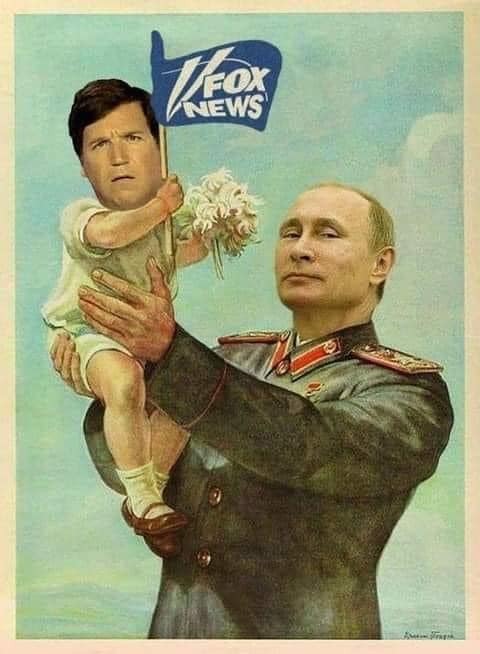
Let's not ignore the man behind the curtain, Rupert Murdoch.
* * * *
Josh Marshall:
The evidence emerging from the Dominion lawsuit against Fox News has the quality of liberal fever dreams. What’s the worst you can possibly imagine about Fox? What’s the most cartoonish caricature, the worst it could possibly be? Well, in these emails and texts you basically have that. Only it’s real. It’s not anyone believing the worst and giving no benefit of the doubt. This is what Fox is. In a moment like this it’s worth stepping way, way back, not just to the beginning of Fox News in 1996 but to the beginning of the broader countermovement it was a part of and even a relatively late entry to.
Back in the 1950s and 1960s there was something historians and critics of the time called the post-war liberal consensus. It was not liberal in ways we’d recognize today. Indeed, it wasn’t liberal in many ways actual liberals of the time recognized. But it did represent an important level of elite consensus about state intervention in the economy and openness to a more restrained version of the American state created by the reformist periods of the first half of the 20th century.
Though what was then sometimes called “the race question” was “complicated” and not something that could be resolved overnight, there was also in elite opinion a general assumption that the South’s system of legalized apartheid was a source of embarrassment and something from the past that the country had to outgrow, even if not any time soon. (Just as is the case today, what is actually more properly called cosmopolitanism was sometimes misportrayed as liberalism: a general belief in pluralism, values tied to cities and urban life.)
I mention all this because, in the early 1950s and 1960s, what we now recognize as the embryonic modern conservative movement could rightly sense that there were assumptions embedded in elite culture that viewed certain of their core values and aims as backward, retrograde, archaic. When the early founders of modern “movement” conservatism looked at America’s elite consensus, they saw a set of assumptions and beliefs embedded in many elite institutions that ran counter to their aims and values. And they were not totally wrong. Over the course of the 1960s and 1970s they set about trying to build a series of counter-institutions, ones that wouldn’t, in their mind, have their sails angled permanently toward the winds of liberalism.
One key moment in this story was the founding of The Heritage Foundation in 1973. Heritage was founded to be the counter to the “liberal” Brookings Institution. But Heritage was never anything like Brookings, even though in the D.C. of the ’80s and ’90s they were routinely portrayed as counterpoints — one representing liberalism and the other conservatism. Brookings was mainstream, stodgy, quasi-academic. Heritage was thoroughly ideological and partisan. In practice it was usually little more than a propaganda mill for the right. This pattern was duplicated countless times.
The “liberal” Washington Post was matched by The Washington Times. Fox News, which didn’t come along for another generation, was not so much the answer to CNN as to CBS News, the iconic broadcast news organization of the first decades of the Cold War. What we see today in Fox News is most of the story: a purported news organization that knowingly and repeatedly reports lies to its viewers, whose chief executive brazenly works with and assists one party’s candidates by sharing confidential information about the other. What has always been the tell about Fox News is the tagline and motto: fair and balanced. The operation’s very branding is an aggressive bit of trolling. An unabashedly partisan and ideological operation selling itself under the heading of “fair and balanced.” It’s less a lie than a knowing taunt.
Here we get to the nub of the issue. Because this is not the entirety of the story. One of the things that is clear from the very start of the conservative movement was a basic failure to quite understand the thing they rallied themselves against, the history that in Bill Buckley’s famous phrase he was standing athwart and yelling “Stop!” None of the organizations that the right took issue with — the think tanks, the news publications, the movie studios, the nonprofits, the book publishers — were ideological, let alone partisan, organizations. When the founders of modern conservatism looked at CBS News they saw the shock troops of liberalism and the Democratic Party. Same with Brookings and the Washington Post and all the rest. And when they went to build their own versions of these institutions they patterned them off their own cartoonish understandings of how these operations functioned. The idea that institutions like CBS News or The New York Times were, whatever their faults and unexamined biases, fundamentally rooted in an ethic of news gathering and reporting was really totally lost on them.
So how do we get from this elemental misunderstanding to the raw and casual lying of the Fox of today? Well, that’s the thing: we don’t. Both were there from the very start. It’s all but impossible to disentangle the culture clash, the inability and refusal to really grasp what these institutions were, and the more open culture of propaganda, lying and mendacity. They’re fused together so tightly that getting your head around the relationship between them is more a matter of meditative absorption than anything that can be processed or explained discursively.
[Taling Points Memo :: Josh Marshall]
8 notes
·
View notes
Note
Like how do you get to that point, me and the persecutor “assigned” to me to basically torture me, I can’t really see us getting along, and I’ve tried to help them but then they go after someone else and they can’t handle it. My brain can’t even compute how that would even happen.
From a similar dynamic, it is largely coming to the realization that even though parts may be entirely different and at odds on the surface, at the core there is something and a value and function that can underlie it all. I don't know the situation with your persecutor part to say this 100% and am mostly speaking from our experience and my own perspective, but I think the issue in your approach is that you are trying to "help them".
Ignore me if this is too aggressive sounding or accusatory - I really just talk like this with the system and don't really know how to turn it off especially when I'm giving criticism, but approaching a persecutor with the intent to "help them" is 95% of the time a self centered and selfish move as most of the time we've seen it, there is an underlying "this part is wrong, bad and acting out because they have a problem / trauma that if I fix / if I can fix for them then they will act how I want them to and stop intruding into my life style". I fully believe you and all other people and parts with this approach have the best intent to it - Riku did it all the fucking time and still does until I fucking hit them over the heads cause its not their job to deal with those parts anymore since they SUCK at it (or at least the initial early stage) - but as the part who now "professionally" works with persecutory parts the approach is entirely flawed.
If you want my best advice, change your perspective from trying to "help" and "fix" them to understanding what they are doing, why they are doing it, and what they actually want from what they are doing. Don't ask about that for your own sake and don't judge any of it as wrong or bad or toxic or problematic, but just straight up listen and find the core reason to the way they are acting and then you can negotiate and compromise a way to make you both get what you want.
You (or someone else in the system) have to step out from the "I am stressed out and this part is hurting me" and push past and through all the harmful garbage and get the part to actually communicate things in a proper and healthier manner - then once you know what they want, you can give them another way to obtain what they want and by doing so you build good faith with them as you are helping them get what they want and also reduce the behavior overall.
Like for me early on, what I knew I wanted was fun, entertainment, excitement, power, and chaos. What I needed was something to give me an emotion other than apathy and the reason I was going for that shit was because they gave emotions I could experience that I had grown addicted to and loving - and so I was heavily sensory seeking, destructive, and craving / baiting / fishing for as much negative attention as I could 24/7. It took a while to get to having the rapport with another part other than Riku (Ray and Lucille iirc) that it became a bit clear that I very much was just dopamine seeking through cortisol and adrenaline rather than healthier ways, and they provided me with positive attention which made me feel a little bit of a positive emotion which then really opened doors for me to perceive and consider a different approach.
Additionally, Riku and I have - or at least used to be since we've started to share more beliefs as we get along and hear eachother out more - extremely different approaches to life and view points on how we should go about things simply by the nature of how we split, but we both at a core found to respect that the both really wanted us to "live our best life" and that both of us were extremely dedicated to our views of what our "best life" was. The details entirely conflicted at first, but latching onto the concept that we were both sharing the same intent of building our "best life" allowed us to leave room for respect on the other's unique perspective. We didn't suddenly start actually doing this or anything and I can't really pin point when we started to work on finding a middle ground, but at a certain point we realized both of our views were entirely flawed in opposing manners and so we just kinda looked and went "Ah, I get it" and then decided to shake on it to have us both entirely work on our forte's and trust the other with the rest.
Riku's perspective was very unsustainable and required being far too fraudulent to their own identity and self for the sake of "stability and peace"; mine was too chaotic, stressful, dangerous, and trauma inducing for the sake of "remaining dominant and being 100% true to ourselves". So at a certain point of slowly gaining eachother's respects we went "hey wait, we have a perfect plan somewhere between us, lets divide and conquer at our strengths and I'm sure that will get us somewhere" and lo and behold it really fucking has. And figuring that our honest quickly set the grounds for EXTREME mutual respect because both of us rapidly found that we could let go of the shit we aren't suited for and not only make progress that we had very much struggled endlessly with before - but we also did not have to worry about it.
Like I'm GOD awful at not putting us in danger and not getting lost in the adrenaline high. As a co-host I can do just fine, but if I was a singlet, I know I'd end up in jail or dead in less than 4 months - even now that is straight facts. The thing thats great about having Riku over here is that they are VERY good at keeping us from being dead and keeping a functioning positive direction to life and so even if I suck at it, if I just defer to Riku whenever it comes to long terms relationship / large scale life decisions, then I never have to worry about my own lack of ability to be a not-antisocial fuck beyond how that affects my inter-system dynamics.
Riku probably has something similar to say on it and I could explain it, but they'll be adding their own two cents to this at some point so I'll just leave that for them to deal with.
But anyways, that's all I have to say on the matter for now. My two cents
-XIV
-----------
I think XIV honestly talked about this pretty well (albeit I only kinda skimmed it since I generally know his opinion on this kind of stuff since we chat about it) but honestly? It kind of comes when you realize how parts play into each other like... on a function level and figuring out a better way to mold and reshape the shit that drives parts against each other into a potential strength.
I've been booted off of persecutory-rehab cause I tend to be "too soft about it" and tend to become a chew toy for them and all and so I'm not gonna advice much on persecutory stuff as much as just *leaves it for XIV* cause that not my expertise (I've been allocated to sad meow wows) but I do like help bounce ideas and information I know about parts in question taht he is working with to help give him some further insight and its like... really important to be able to also take a step back and really see how the tendencies and ways one part is reflects and plays into another part.
While it can be hard to see from the inside and while in the midst of it, we are all interconnected and parts indirectly affect one another regularly. Closely connected parts (positive or negative) tend to serve a closely related like... function to one another and getting a like eagles eye view of why parts are the way they are can help you modify it to be beneficial.
What are points of contention and conflict and hate between parts can - with effort, time, understanding, and integration (not fusion) - can become points of strength and completion. Usually conflict and contention stems from parts having drastically different opinions and feelings on topics and once you manage to pull back from the fight-flight that can cause and can engage in conversation > debate, having drastically different opinions can really be an extremely helpful strength because then parts that don't see the same as you can add input and insight you are otherwise blind to.
Theres a lot of shit I don't know about that XIV does and vice versa. Once we acknowledged neither of us have a clear perspective and view of the events and world around us, it was a lot easier to respect a lot of our drastically opposing stuff and put aside bad blood to share and get a better vision of our life past, present, and future and make the best plays we can with this much more complete vision.
I dunno, I think XIV covered this well enugh though.
-Riku
#recovery#alter: xiv#alter: riku#riku squared#ask#asks#persecutor#persecutor recovery#actuallydid#dissociative identity disorder#system dynamics
9 notes
·
View notes
Note
I like your page, but for the last couple of days, it's been all about Emma and the domestic case. It's a little too much tbh (similar to the gftwd page when it was all about Frances). I think we all agree that we don't like her, so why waste our energy on her. Even if everyone in Hollywood would cancel her, Evan would probably stick up for her. I rather read some damn tea about the man. For example Alexia sexy blog about him.
i think it's worth talking about since i am sure you're not the only one who feels this way, not just about this topic but certainly about others. as far as i'm concerned it is perfectly fine to not be interested or enjoy certain topics we cover on this blog and want to sit them out; it's conversational, and more often than not there are multiple different topics simultaneously going on. i am here for discussion, and as i said in the beginning, this blog belongs to those that send messages in and engage as much as it does to me, and no reasonable topic will be barred. that means i am not always going to be at the steering wheel, but chances are i will have something to say.
i think the interesting thing i have learned over the past couple of months is that every week or two we kind of focus on a different topic, but it just happens organically. we also talk about things that seem to not be accepted on other platforms. and that's kind of the beauty of it: if you wanna talk about alexia, you can just send me an ask and we will talk about it. i see you don't follow me, and i am not cluttering evan's tags with the 20 DV discussion posts. or any posts, because i seldom tag anymore. so many new, bothersome (now blocked) people found me in the wake of the haley/evan reveal and they were sending in nasty, hateful things about her. i have probably deleted well over 100 asks. i don't need those followers. i would rather engage with the really cool, fun people who are already here.
also, it tickles me that whenever someone wants to burn me they compare me to gftwd, like she is donald trump or something lol ironically though, her page quite literally began as an effort to expose frances' misbehavior. so it was not unreasonable that all her posts were about fran, that was literally what any follower of hers signed up for. and so long as the critique was fair, there's nothing wrong with it. the issue that myself and many others found was the direction it ultimately took, in regards to the type of comments and criticism being made. i also think it's apples to oranges if someone were to compare the two, but that's because of my own personal belief system and how i feel about domestic abuse. i will outright tell you that i could not give a rat's ass if someone comes here and says something diabolical about emma, because she did something i view as evil, and the people who perpetrate a narrative that shames, blames and accuses a victim of DV are absolute scum in my eyes. i see frances as an irritant, a pest with a grating internet persona - but ultimately, she is nothing to lose sleep over. and i do not let people come on here and say cruel things about her for that reason.
2 notes
·
View notes
Text
By: Rio Veradonir
The term “wokeism” is thrown around a lot these days, but what exactly does it mean? Merriam-Webster defines “woke” as “Aware of and actively attentive to important societal facts and issues (especially issues of racial and social justice).” That definition sounds lovely, but it doesn’t say much about the specific nature of that awareness. For one thing, so much hinges upon what we mean by “social justice” because how people think about social justice determines how they perceive “wokeness.” The positive-seeming dictionary definition of “woke” also doesn’t account for the evolution the word has undergone — from a niche term in 20th century black activist circles to a momentarily trendy way to identify with left-wing social justice movements of the 2010s to a political Rorschach test. Today, the term “woke” is used largely as a pejorative by its critics and has all but been abandoned by those who are “Actively attentive to issues of social justice.” To complicate matters further, there are multiple ways to support or oppose social justice based on the different values and motivations of various political factions. What is sorely needed is some clarity.
If we are to make any progress, it would help to first come to a consensus about what we are discussing. In that spirit, it’s important to understand the different perceptions of social justice and, therefore, wokeness.
TWO KINDS OF SOCIAL JUSTICE:
Liberal Social Justice (LSJ) can be summed up as the belief in the equality of individuals: equal treatment under the law, regardless of sex, race, sexuality, gender identity, religion, etc. This is what “social justice” traditionally meant, and it was how most abolitionists, civil rights campaigners, and LGBT rights activists used and understood the term, despite some internal disagreements within these movements. That is, right up until the “Great Awokening” of 2014, when it took on a new meaning, thus requiring a distinction.
Critical Social Justice (CSJ), by contrast, is a far-left ideology aimed at achieving what some call “equity”, or equal outcomes. It confidently views all social and economic disparities between groups as purely the result of discrimination and systemic bigotry. It advocates corrective social engineering policies such as quotas, preferential treatment, and overt government discrimination in favor of certain groups — even though this violates the liberal principle of equal treatment. CSJ also views existing institutions as irredeemably bigoted and therefore in need of dismantling, which it aims to do through relentlessly criticizing, or “problematizing”, virtually every facet of society, with a particular focus on language.
We here at QM support liberal social justice. The critical approach is a threat to equality and human rights, including LGBT rights, because of how it inspires backlashes and undermines the core principles of the Civil Rights movement. CSJ embodies “wokeness” in its negative and correctly pejorative sense. The only consistent and effective way to champion LSJ — actually being “awake” and constructively rectifying injustices — is by opposing CSJ as well. In doing so, it is crucial to persuade other liberals to abandon the critical approach and thus denude it of its influence. We understand that this comes with challenges. Shining a spotlight on CSJ can create confusion, panic, and even resentment, as people reflexively dig in and defend the ideas that have given them a sense of identity, belonging, and pride.
(For more about the difference between LSJ and CSJ, see here.)
FIVE CONCEPTIONS OF “WOKE”:
1. The Liberal Conception: “Wokeness” equals Critical Social Justice.
“Liberal” here refers to those who believe broadly in the foundational principles of philosophical liberalism (not the modern US colloquial version per se, which refers to people left-of-center or aligned with the Democratic Party). Believers in Liberal Social Justice oppose Critical Social Justice because CSJ entails violating the principle of equal treatment in an undemocratic and even authoritarian attempt to dismantle and re-engineer society. Liberals, therefore, tend to use “woke” pejoratively only when referring to CSJ, which serves liberal interests by emphasizing that liberalism is distinct from “wokeism”, thereby distancing it from CSJ’s failings, including its propensity to engender backlash. This liberal conception is the most commonly held conception of wokeness, spanning across the political spectrum. In a 2022 poll, 78% of US respondents expressed agreement with the liberal statement, "We should aim for equality of opportunities, not equality of outcomes."
Despite its popularity, this conception struggles to influence the levers of political power at the moment because its adherents are dispersed across the political landscape and also due to partisan dynamics. In party politics, overall societal attitudes sadly often take a backseat to the will of the mobilized base, from whom most of the money and reliable votes come. In these small circles, the liberal cohort is currently outnumbered.
2. The Dissonant Conception: “Wokeness” doesn’t exist (but it’s good if it does).
Some people who think of themselves as liberal uncritically support both Liberal and Critical Social Justice, even though they are incompatible with one another. In some cases, this is because they don’t understand the difference between the two or are unaware that there is more than one school of thought on social justice to begin with. This is usually born out of a well-intentioned attempt to be “on the right side of history” without having delved very deeply into modern social justice movements and how many of them differ from the version with which they may have grown up. For others, any differences or contradictions between LSJ and CSJ pale in comparison to the need to resist the hard right. To them, the fine print is less important than the primary objective of fighting the right, and they see a blanket advocacy of all versions of social justice as providing a more unified front against it.
As such, the Dissonant Conception either willfully or unconsciously ignores the conflict between the liberal and critical approaches to social justice. Those who hold it are not orthodox believers in all of the doctrines of CSJ, but they nevertheless embody its general “orthopraxy” — its code of conduct. They agreeably go with the flow of CSJ, often without knowing the finer points of what it espouses, either to avoid being perceived as “on the wrong side” and thus shunned by their in-group, or as part of a strategy to oppose the political right. Such people account for a large portion of CSJ advocates. They mistakenly think that any talk of “wokeism” is simply reactionary backlash from right-wing bigots who oppose racial equality, gender equality, or LGBT rights.
The dissonant cohort is drawn predominantly from folks left-of-center, usually partisans of left-aligned political parties, often middle-aged or older, including some self-identified “progressives.” As they are concentrated within a much narrower band of the political spectrum, they have more influence because they make up a large part of those active in organizing left-leaning parties. This group’s conflation of both understandings of social justice defines most of the debate around “wokeness” and feeds red meat to the regressive and Marxist conceptions. Many dissonants set out to oppose the right, but in backing critical social justice, they provide social conservatives with needless ammunition and have invested massive amounts of energy in a political movement at odds with their own core values.
3. The Regressive Conception: “Wokeness” equals any social justice and is always bad.
This group opposes both Liberal and Critical Social Justice. Therefore, they equate both approaches with the pejorative use of “wokeism”, usually without any nuance. The black-and-white rhetoric they employ, which conflates all forms of social justice with the worst excesses of CSJ, serves to feed an engineered backlash that by design sweeps up LSJ along with it. Anti-wokeism, for this group, is a polite cover for old-fashioned bigotry — the perfect opening to reinject the same regressive attacks on liberal pluralism they’ve been harping on for decades. This cohort includes much of the Christian Right, as well as some who see themselves as “true conservatives” or “paleoconservatives” (harkening back to pre-liberal conservatism). Some even identify as theocrats or fascists. As QM’s Jamie Paul noted, “Critical Social Justice is the best thing to happen to the Christian Right since the Cold War, because it has made them relevant again.”
Make no mistake: this group is very different from liberal critics of CSJ. They are often genuinely racist, sexist, and homophobic partisans, feeding off the chaos and confusion of the culture wars, drawn almost exclusively from the hard right and right-wing populism. While they may be greatly outnumbered in society, they enjoy an outsized influence within right-leaning political parties — especially in places where disenfranchised, white, working-class voters dominate elections.
4. The Critical Conception: “Wokeness” is a good thing (but only Critical Social Justice qualifies).
This school of thought opposes Liberal Social Justice and only supports Critical Social Justice. In keeping with the tenets of CSJ, the critical cohort doesn’t believe that objective truth exists (postmodernism), instead favoring narratives of identity, power, domination, and oppressor versus oppressed (standpoint epistemology). CSJ cherry-picks the trendy bits from modern socialism about “eating the rich” and banning billionaires, then mixes and matches them with postmodernism and intersectionality, identity-based thinking, which subordinates the role of class to one of many factors in the oppression Olympics. They explicitly argue that women, POC, and LGBT people must make common cause with the working class by supporting intersectional socialism — with left-thinking white men as dutiful allies, of course. To the critical cohort, any tool for dismantling liberalism will do. They don’t care about logical consistency (which they regard as a tool of “cisheteropatriarchal white supremacy”) because they are utterly convinced that the status quo is rotten to the core and must be completely dismantled by any means. They are much more philosophically literate than the dissonant group, and they tend to proudly identify as “woke” (by which they mean awake to “critical” attitudes toward liberalism). The liberal approach to social justice is disparaged as naïve at best and a cynical distraction from “the work” of critical activism at worst.
This group makes up less than 10% of society, comprised mostly of the far-left or “progressive” wings of left-leaning political parties. They leverage the more numerous unwitting advocates of the dissonant conception, though if history is any guide, these extremists will turn on their confused liberal allies at the first opportunity.
5. The Marxist Conception: “Wokeness” is capitalist propaganda.
To traditional Marxists, “wokeism” is the specific version of Critical Social Justice supported by the dissonant cohort. Marxist antipathy for CSJ is directed only at the dissonant conception, which they deride as “woke capitalism.” The Marxist attitude toward the critical cohort is entirely different. While they have much in common in economics, traditional Marxists diverge from the critical conception on matters of priorities. For traditional Marxists, the road to progress always runs through class-based thinking — economic justice is social justice, and class equity is equity. Nevertheless, the critical faction are still socialists of a kind, or close enough, so traditional Marxists generally don’t make major adversaries of them. The dissonants, however, are capitalists, a sin that Marxists cannot tolerate.
Some self-identified “conservatives” (of the regressive conception) also invoke “woke capitalism” because they share Marxism’s hatred of classical liberalism and its anti-elite populism, albeit for different reasons. Most traditional Marxists regard liberalism, with its emphasis on individual rights, as the enemy of their vision for the collective good, which requires greater subordination of the individual to the group.
Traditional Marxists are minuscule in numbers but overrepresented and very noisy on social media. They generally hate all major political parties. Many don’t vote at all, and they seem to have virtually zero governmental power. Their online influence, however, can exaggerate the popularity of their views and influence the conversation more than it should.
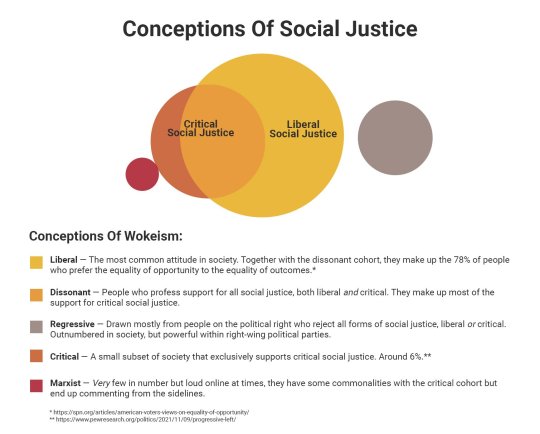
* * *
So what does this all mean, exactly? Are we doomed to speak past one another on this subject? Is there any hope of finding common ground? Yes, there absolutely is. Despite being at odds with one another (for the time being) about the trendy “critical” approach to social justice, both the liberal and dissonant cohorts support the more moderate Liberal Social Justice. Together, this liberal coalition is both large and powerful, as evidenced by the simple fact of how much progress we have made on issues such as same-sex marriage, LGBT acceptance, attitudes about interracial marriage, and civil protections from discrimination on the basis of race, sex, sexuality, or gender identity. Liberal social justice won these victories, and it’s how we will preserve and expand our freedoms as well.
To these ends, it is imperative that the dissonant group be persuaded to abandon critical social justice, not only because they are an indispensable part of the liberal coalition but because they are the only cohort in need of persuading who are actually persuadable, as they already have a foot in the liberal door, so to speak. In doing so, we must address both their concerns and motivations. We must clearly communicate the problems of the critical approach and its incompatibility with liberalism without being perceived as right-wingers. We must make the case that, in fact, CSJ ultimately serves only to weaken LSJ and empower the far-right. We must spell out the ways in which CSJ works against the stated liberal values held by the dissonant faction.
The cohorts who support critical social justice, as well as those who reject all forms of social justice, are small. CSJ is not popular. Regressive social conservatism is not popular. And Marxism is not popular. It is only by conflating liberal and critical social justice as the same thing that the far-right can muster the support necessary to deal serious damage to human, civil, and LGBT rights in the West. By shoring up the liberal coalition and jettisoning CSJ, we can take a potent rallying cry away from our opponents and strip CSJ of the bulk of its adherents in a single stroke. There may be little point in trying to persuade dyed-in-the-wool extremists to abandon their illiberal dogmas, but we don’t have to. Liberal Social Justice has prevailed without them before, and it can do so again. With the detour of CSJ behind us, we can resume the work of preserving and expanding liberty at home, as well as spreading it to less liberal parts of the world where people still suffer under far worse oppression. Then, and only then, can we accurately and honestly call ourselves “woke” in the positive, liberal sense.
#Rio Veradonir#wokeness#wokeism#cult of woke#woke#wokeness as religion#woke activism#critical social justice#liberal social justice#liberal ethics#liberalism
15 notes
·
View notes
Text
A really Nice book called Viewpoints from my favorite tutor
I love it because it includes various profound and thought-provoking viewpoints.


NOTES
Someone once said that there are three sides to every questionable issue: your side, my side, and the "right" side. In truth, there may be many sides, depending upon the issue itself.
According to psychologists, numerous studies have been done that show the urge to conform to group thinking is too powerful for most people to resist. Unknowingly, we become conditioned to ways of thinking. This usually happens because we are molded at an early age by our parents, relatives, teachers, and friends. we tend to honor their value systems because we love them and trust their judgments. Their beliefs become our beliefs without much questioning or thought on our part.
As we mature, our beliefs are also molded both directly and indirectly by the media. What we wear, what we eat, what music we accept, even what media we enjoy become tied in with our desire to be accepted as part of a group. Even when we think we are acting as individuals by rejecting the ideas of one group, we are often just accepting the ideas of another. We become self-deceptive. Our thinking process becomes overruled by others' opinions that we think are truly our own thoughtful reactions because we have heard them for so long. We become biased and forget to weigh our opinions by looking at facts or reasoning that goes against our belief system. And even when we do try to see "facts", we often don't have the experience needed to evaluate the information. In such cases, it is better to suspend our decision on which "side" to take until we do some more investigating.
If you already have a viewpoint on one or both of the topics, try to suspend your opinions as your read the selections. Avoid letting your own biases cloud any opinions that are opposite to yours, not always an easy task. We sometimes have a tendency to view ourselves as superior to another person's race, religion, or culture even though we may not think we are doing so. Such views limit our objectivity and keep us from learning from others.
New information on these and other controversial issues continues to come out. What you think today, may not be what you think tomorrow. That's healthy, too, as long as you are truly making sound judgments and critically weighing the evidence. A changing mind is better than a closed one.
#Viewpoints#learn chinese#learning english#quotes#life#life quotes#profound#topics#opinions#books and literature#books and libraries#education#looks over books
2 notes
·
View notes